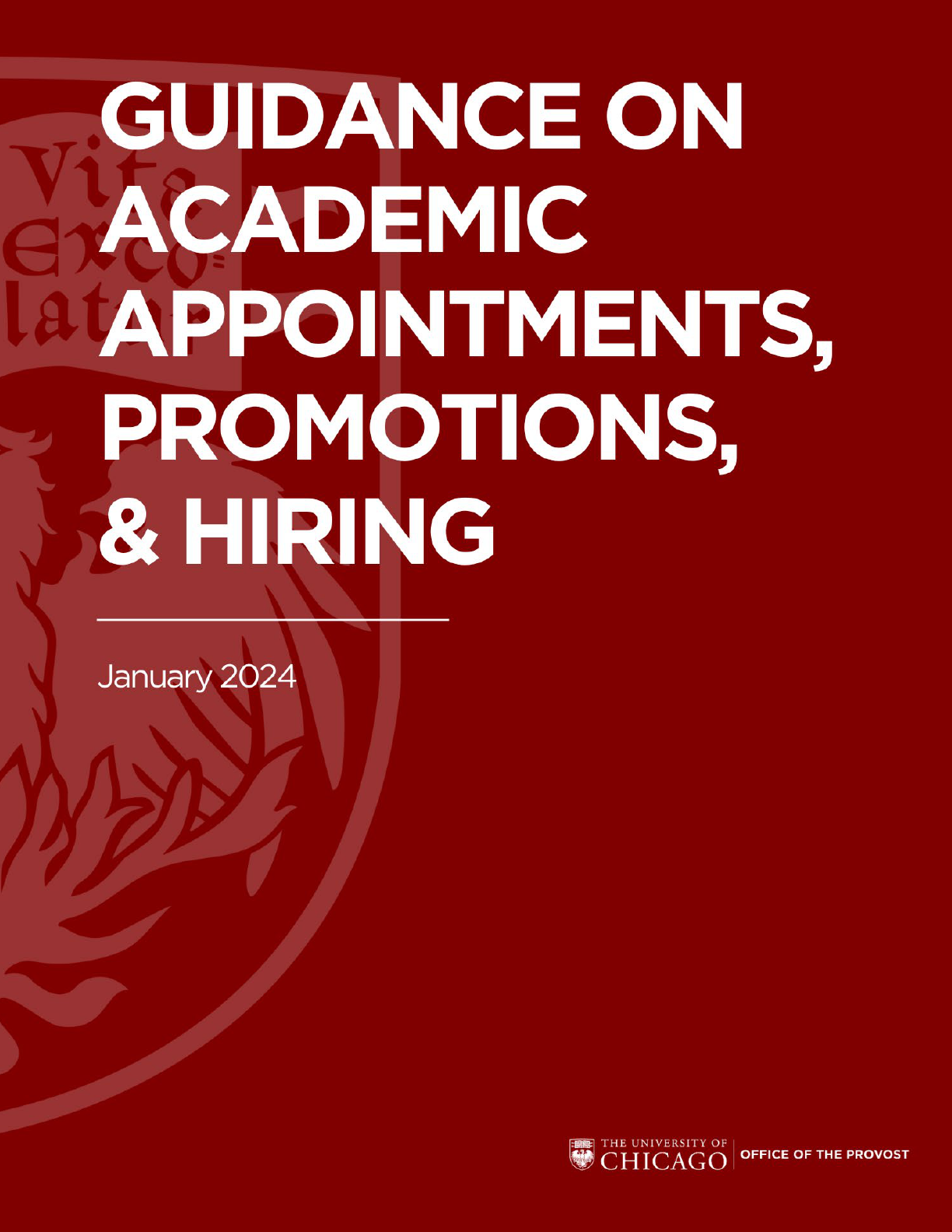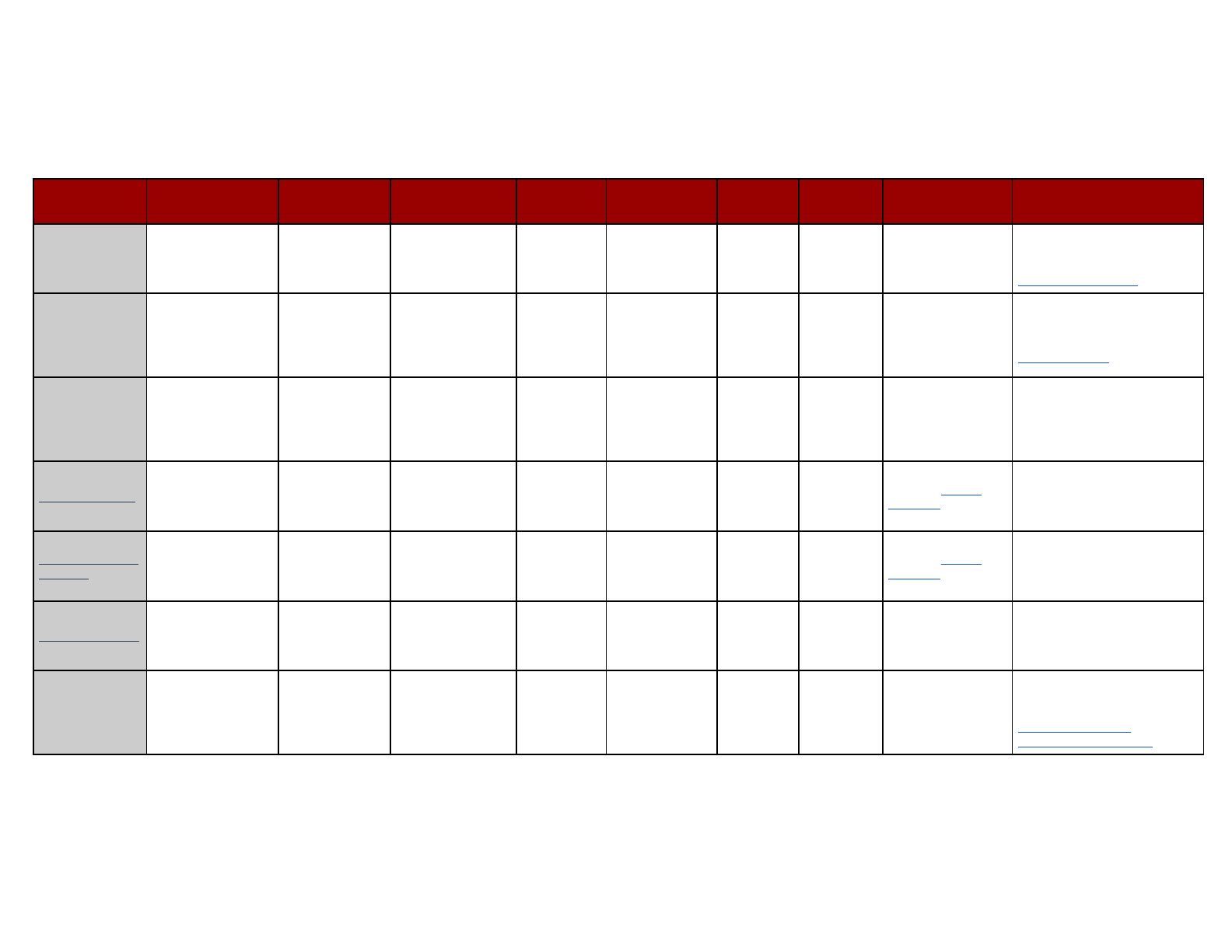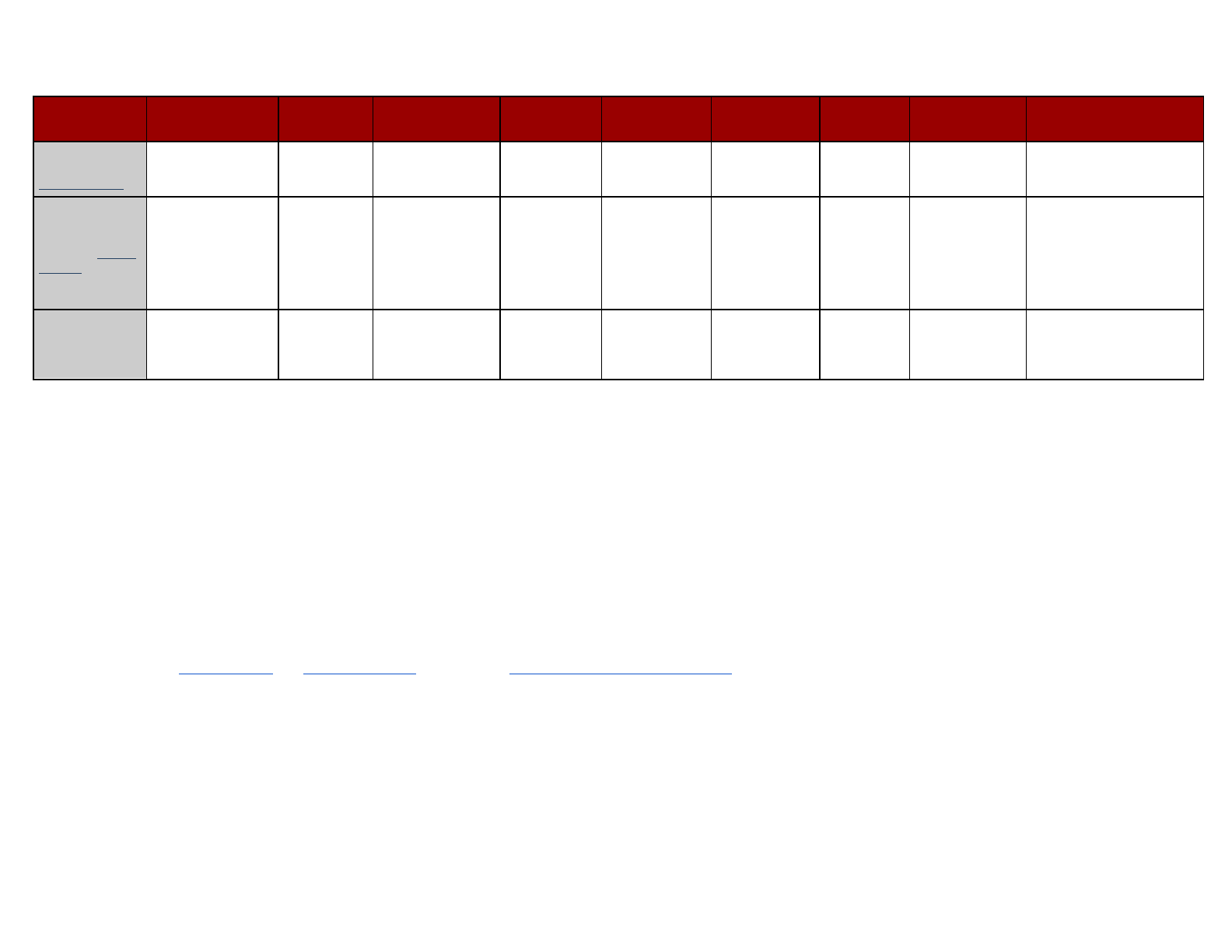
1
F

THE OFFICE OF THE PROVOST | 2
TABLE OF CONTENTS
INTRODUCTION 3
1 ACADEMIC HIRING POLICY 4
SECTION 2: FACULTY APPOINTMENT, REAPPOINTMENT, AND PROMOTION CASES 13
2.0 Components of a case 15
2.1 Cases for all new appointments 20
2.2 Cases for new appointments without tenure 21
2.3 Cases for promotion from instructor to assistant professor 23
2.4 Cases for reappointment as assistant professor 24
2.5 Cases for appointment as or promotion to associate professor with tenure 26
2.6 Cases proposing promotion to associate professor for a term 27
2.7 Cases proposing appointment as or promotion to professor 28
2.8 Special Situations 29
SECTION 3: GUIDELINES ON SENIOR INSTRUCTIONAL PROFESSOR APPOINTMENT, REAPPOINTMENT, AND PROMOTION 30
3.1 Components of a Case: Initial Appointments and Requirements for Job Postings 31
3.2 Components of a Case: Reappointment and Promotion 32
3.3 Senior Instructional Professor Job Framework 33
3.4 Senior Lecturer 35
SECTION 4: GUIDELINES ON LECTURER AND INSTRUCTIONAL PROFESSOR APPOINTMENT, REAPPOINTMENT, AND PROMOTION 36
4.1 Initial Appointment and Requirements for Job Postings for Instructional Professors and Track A Lecturers 36
4.2 Reappointment and Progression Criteria for Instructional Professors and Track A Lecturers 38
4.3 Criteria of Evaluation for Track A Lecturers and Track B Instructional Professors 43
SECTION 5: GUIDELINES CLINICAL APPOINTMENTS, APPOINTMENTS FROM PRACTICE, AND RESEARCH APPOINTMENTS 46
5.1 Academic Appointment Types and Tracks in the Division of the Biological Sciences (§11.2.1) 47
5.2 Professors from Practice and Clinical Appointments in the Law School 48
5.3 Clinical and Adjunct Appointments in the Booth School of Business 49
5.4 Research Appointees 50
5.5 University Librarians 53
5.6 Professors of Practice in the Arts in the Division of the Humanities 54
5.7 Adjunct and Clinical Appointments in the Division of the Physical Sciences 56
5.8 Clinical Appointments in the Division of the Social Sciences 57
5.9. Visiting Appointments 58
SECTION 6: RESOURCES FOR ACADEMIC SEARCHES 59
6.1 Search Committee Trainings 59
6.2 Search Resources and Example Checklist 60
APPENDIX A: COMPLETE LIST OF MATERIALS REFERENCED IN THIS DOCUMENT 61
Relevant Documents 61
Relevant Links 61
Important Contacts 62
APPENDIX B: SEARCH DOCUMENTS AND FORMS 63
Search and Screening Narrative 63
Engaging a Search Firm 63
APPENDIX C: SUPPLEMENTAL DOCUMENTS AND RESOURCES FOR ACADEMIC RECRUITMENT 64
Building a Strong Applicant Pool 64
Guide to Acceptable Interview Questions 66
Additional Considerations and Resources for Recruitment 67
APPENDIX D: SPECIAL SITUATION APPOINTMENTS AND POSTDOCTORAL APPOINTMENTS 68
APPENDIX E: GUIDELINES ON FACULTY APPOINTMENT, REAPPOINTMENT, AND PROMOTION REVISION HISTORY 70

THE OFFICE OF THE PROVOST | 3
INTRODUCTION
The University’s intellectual community is defined by its faculty and other academic appointees. The Office of
the Provost collaborates with deans, department chairs, and faculty search committees to identify and recruit
bold thinkers, field-defining researchers, outstanding teachers, and individuals with other skills that are
central to the eminence of the University.
All members of the Faculty at the University of Chicago must have a distinguished record in research,
teaching, and training (including the supervision of graduate students), contributions to the intellectual
community, and service when being considered for promotion, according to the Shils Report, produced in
1970 by the Committee on the Criteria of Academic Appointment appointed by University President Edward
H. Levi.
Every appointment, reappointment, and promotion must be solidly grounded in actual accomplishment
which, when coupled with evidence of future promise, gives rise to a strong likelihood that the candidate will
bring continued and increasing distinction to the University over the entire course of the candidate’s
academic career here. These principles guide University departments, divisions, and schools in evaluating
faculty for promotion and/or tenure.
This guide contains the most current versions of a number of documents related to all aspects of the
academic life cycle for faculty and other academic appointees at the university, from search and screening to
review, reappointment, and promotion.
For more information or questions related to these policies and procedures, please reach out to the Office of
the Provost’s main contact regarding academic searches, promotions and appointments, Vice Provost Jason
Merchant, via phone at (773) 702-8523 or via email at merchant@uchicago.edu.

THE OFFICE OF THE PROVOST | 4
1 ACADEMIC HIRING POLICY
The following applies to all benefits-eligible academic appointments:
The distinction of the University of Chicago rests on the research, teaching, and service of the academics who
work here. The goal of every academic search is to seek out and find individuals who are qualified to make
contributions to the University’s distinction. The University aims to build a scholarly community comprising a
mix of individuals of all backgrounds, nations, and viewpoints, who make unique contributions to its
intellectual culture.
This academic search policy is intended both to help units attract large and diverse applicant pools for every
open academic position at the University, and to enable department chairs, deans, directors, and the provost
to monitor the search and screening processes that preceded a request to the provost for authority to offer
an academic appointment.
Every appointment at the University of Chicago must be solidly grounded in actual accomplishment which,
when coupled with evidence of future promise, gives rise to a strong likelihood that the candidate will bring
continued and increasing distinction to the University over the entire course of the candidate’s academic
career here. The following policy, in addition to the Shils Report, should serve as a roadmap for robust,
compliant searches.
1.1 Compliance obligations
The Provost’s Office expects that the documentation of a search for a pool of applicants and of the
screening of those applicants will show that the steps outlined below have been followed.
To support academic search and recruitment processes, the University of Chicago uses Interfolio’s search
module. Unless an exception has been granted, search administrators, evaluators, and unit leaders must use
the module, called Academic Recruitment, to post positions and manage search processes.
As a federal contractor, the University is also obligated to monitor and evaluate our hiring and other
employment processes for compliance with the law and University policies, including:
● Shils Report
● Equal Employment Opportunity Policy
● Policy on Discrimination, Harassment, and Sexual
Misconduct
● Guidelines on Faculty Appointment (Section 2)
The University is also an affirmative action employer, which means it is obligated to take active steps to
recruit and advance qualified women, racial and ethnic minorities, individuals with disabilities, and protected
veterans. At the same time, the University is legally prohibited from considering applicants’ race, sex,
national or ethnic origin, or other protected class status in making hiring decisions. The policies and
expectations of the Provost’s Office are consistent with our compliance obligations and support search
processes that will attract pools of applicants which are diverse across many dimensions. When units act with
fidelity to the policies and procedures here established by the University, then one of our central obligations
as a federal contractor is met.

THE OFFICE OF THE PROVOST | 5
1.2 Pre-search planning and developing a position description
Before posting a job, it is important to consider the needs of the department, as well as how this specific role
will meet those needs and help to meet departmental goals. Once those parameters have been defined, you
can begin to build out the role.
A well-crafted position description not only helps attract the broadest applicant pool, but also avoids process
problems down the road that could needlessly delay the review of a case or, in exceptional circumstances,
require redoing a search or turning down a hiring recommendation. Position descriptions for academic
appointments should never be tailored to fit a candidate who has already been identified.
A position description should be comprised of three elements:
1. the details of the job and unit, and
2. the qualifications of the applicant, and
3. the required application materials and how to apply.
Within Interfolio’s Academic Recruitment module, these can be divided into three separate sections to aid
applicants in locating important information.
Qualifications
Job descriptions typically contain two types of qualifications: minimum and preferred:
Minimum qualifications are skills, degrees, experience, etc. without which a person cannot do the
job.
Examples of minimum qualifications can include: terminal degrees in a field or subfield, years of
experience in a similar position, licensure, record of publication in peer-reviewed journals, or a record
of funding.
Preferred Qualifications are skills, experience, specific expertise, training, etc. that go beyond the
minimum qualifications.
Examples of preferred qualifications are experience with specific programs like Canvas or Blackboard,
expertise in a certain sub-field, additional degrees, or work experience.
It is important to note that search committees may not legally consider anyone who lacks the stated
minimum qualifications, regardless of the jobseeker’s promise, because such a person, by definition, is not a
qualified applicant. Moreover, the search committee is required to review any applicant who meets the
minimum qualifications; the search committee should not classify as “not qualified” any candidate who
meets the minimum qualifications (the search committee may of course decide not to consider further any
applicant who in their judgment is not among the best in the pool).
For example, if a position description states that a “PhD is required” in order to apply, any job seeker who
does not hold that specific degree at the time of application may not be considered or hired. For example,
requiring just a “doctoral degree” obligates the committee to consider individuals with a JD or MD.
Since requiring candidates to hold a PhD degree to apply will exclude all job seekers who do not have a PhD
degree in hand, many units stipulate that “having the PhD in hand by the start date” is a condition for
beginning the appointment. (Note that a new Assistant Professor must either have been granted the degree
or have an official letter attesting to the fact that all requirements for the degree have been completed).

THE OFFICE OF THE PROVOST | 6
Likewise, identifying specific subfields of interest as a required qualification means that all jobseekers who do
not specialize in one of those subfields will not be allowed to proceed through the applicant system. By
contrast, identifying one or more subfields as “preferred” might expand and diversify the applicant pool.
For these and other reasons, qualifications must be drafted with care, combining what is required with
preferred qualifications in a way that promotes the unit’s and the University’s goals.
1.3 Seek potential applicants routinely and actively
It is completely appropriate to identify and keep in touch with individuals who, when a position opens, will be
encouraged to apply and compete for it. Department representatives should also use every opportunity to
communicate the teaching and research opportunities available at the University whether or not a search is
underway.
Broad outreach efforts may be supplemented by personal communications to potential applicants, ranging
from graduate students and postdocs who might consider an academic career and whose training has
prepared them to be competitive for a position at the University, to senior and experienced scholars and
scientists inside and outside the academy as appropriate for the position advertised.
When a position is opened, thoughtful and targeted outreach beyond mere advertising may be essential. All
outreach and advertising must also be documented in the search narrative to clearly outline what steps were
taken to develop a diverse, expansive applicant pool. These activities must be documented because the
University is required by the federal government to show that those involved in hiring make good-faith
efforts to develop broad and diverse applicant pools.
All involved in the search process must understand certain basic principles. Outreach may include extra and
targeted efforts to search for women, racial and ethnic minorities, individuals with disabilities, and protected
veterans. However, (1) outreach must not exclude any group, and (2) screening and winnowing down the
pool must not prefer anyone based on protected class status.
1.4 Create a search plan
Units are strongly encouraged to fill out a Search and Screening Plan before starting any academic search. A
search plan not only helps ensure compliance and shortens the review times in the deans’ and provost’s
offices, but also provides a mechanism for the search committee to plan each person’s role in reaching out
nationally to attract a robust pool of applicants. Including documentation that search committees are
required to submit to the provost as part of the search narrative at the end of the search, or at least
establishing how the material will be gathered, also avoids process problems down the road that could
needlessly delay the review of a case or, in exceptional circumstances, require redoing a search.
1.5 Determine what application materials will be required
The position description must state in detail what materials an individual must submit in order to apply, and
in what format the materials should be submitted, if relevant. In every instance, the instructions must
indicate that a CV is to be uploaded into the Academic Recruitment module during the application process.
Information on required materials for faculty and other academic appointees can be found in sections 2, 3,
and 4 of this guide. If additional materials are requested at a later stage of a search, this process must be
documented in the search narrative and care must be taken to solicit information from all the candidates at
that stage of screening to ensure uniformity.
Only candidates whose application materials are complete (i.e. submitted all items required in the posting)
can be considered an applicant and included in the screening and selection.

THE OFFICE OF THE PROVOST | 7
1.6 Encourage timely application
Although the position description does not need to include the date on which review or screening will begin,
if such a date is included, the date must be at least thirty (30) days after the first public advertisement has
appeared, or, for searches that do not require a public advertisement (see 1.11), thirty (30) days after the
posting has been activated on the UChicago Academic Recruitment job board.
This thirty-day rule precludes screening and comparing qualified applicants before the thirty days have
elapsed: it is the responsibility of the search administrator not to give the search committee access to the
pool prematurely.
Benefits eligible postings must not state that review or screening will begin “immediately.” Keep in mind that
every applicant who meets the stated minimum qualifications must be fully considered. Therefore, never
make statements such as, “To receive full consideration, apply by [date].”
1.7 Deadlines for job seekers
For jobseekers, a “deadline” is either:
● The deadline selected for the posting by the unit creating the position (which the Academic Recruitment
module will explicitly show on the posting)
● A date by which the position will stop accepting applications (for rolling deadlines).
If the posting states a deadline explicitly, it must not be removed from the job board before that date.
Although postings are not required to state a deadline, search committees should be familiar with the
policies that control the timing of phases of the process and should thoughtfully consider how best to
communicate with job seekers.
● Search committees must plan at the outset whether to announce a deadline for job seekers to complete
their applications, or to allow the applicant pool to grow after the screening process begins.
● It is permissible to not state a deadline, but units then incur an obligation to track and consider all
applicants. Using such language as the “Screening of applications will continue until the position is filled or
the search is closed” makes it possible for a unit to close the search (removing the posting from the Web)
when a candidate is selected, and a set of back-up candidates is identified.
1.8 Deadlines for units
For units, there is a deadline after which they may not bring forward candidates from an applicant pool.
These deadlines are intended to assure that the pool of candidates is refreshed as candidates enter the
market each year. Units should be mindful of these deadlines, and plan accordingly.
A. For faculty positions, recommendations to the provost must be received within two (2) years from
the initial date of the posting.
B. For all other academic job groups, recommendations to the provost must be received within one (1)
year from the initial date of the posting.
C. Units wishing to continue to search for or screen applicants for a position after this deadline must
create a new posting and begin again to search for qualified applicants.

THE OFFICE OF THE PROVOST | 8
1.9 Establish clear screening criteria
The specific criteria used to screen applicants must be stated in the “search narrative,” described in more
detail in section 1.14. An evidence-based screening process depends on forming an early consensus on the
specific criteria that will govern the search committee’s screening. For instance:
● What are the qualities that committee members will be looking for in an applicant’s research?
● How are those qualities identified and assessed?
● What are the expectations with respect to publication?
● What evidence of teaching excellence will the committee be looking for?
● Are there particular markers of quality that will move an applicant to the short list?
1.10 Create a posting
All academic positions must be posted through the University’s Academic Recruitment module (or an
alternative platform that a unit has been authorized to use) and only those job seekers who complete an
online application by the deadline may be considered applicants for a position. The University’s posting is the
official announcement describing the position, qualifications, and procedures for applying.
All postings for new academic positions must be approved by the respective dean’s or director’s office before
the position is published through the system and a search commences. It is the dean’s or director’s
responsibility to review the prepared posting (either before it is entered into the Interfolio search module or
after, as long as the final posting is the version approved) to ensure that it meets our compliance obligations.
Guides for the academic search module are available on the Academic Recruiting System website.
1.11 Publicize the position and conduct outreach
After the posting is approved and published through the Academic Recruitment module, the position must be
advertised in appropriate venues outside the University to generate the broadest applicant pool and to meet
our obligations as an affirmative action employer.
Appropriate advertising venues are, at minimum, those commonly recognized in the field of study and that
are likely to reach potential candidates at the appropriate level of seniority for the position. The text of the
position description in the external advertising must be identical with the text of the position description in
Interfolio, including specific instructions for applying through the Academic Recruitment module (or
alternative platform a unit has been authorized to use) and the EEO/AA statement built in to each posting on
the job board.
Units seeking an exception to the requirement that external advertisements must be identical to the posting
in Interfolio must contact the Office for Equal Opportunity and Access and the Office of the Provost for
approval. In the professional schools, where one advertisement may be used to announce open positions in
different disciplines, the advertisement must include links to separate postings for each of these disciplines
so that job seekers can select their field of expertise when applying.
Although a posting is required for every academic opening, advertising is required only if the position is
“regular” or, if the position is within a bargaining unit, its incumbent is able to progress to a “regular” position
without a competitive process. To be “regular,” the job must be at 50 percent effort or more, and for a term
of at least twelve (12) months. If the job is non-renewable, advertising is not required.

THE OFFICE OF THE PROVOST | 9
Openings may also be publicized on departmental/school/institute sites and the like, but they must direct
people to apply and provide required materials through the Academic Recruitment module (or alternative
platform a unit has been authorized to use). Unit channels cannot substitute for the public posting and
advertising process. When positions are publicized on departmental/school/institute websites, the web
pages must carry the same non-discrimination statement required in advertisements.
1.12 Review advertisements for accuracy
All advertising must include the mandatory non-discrimination, Affirmative Action/Equal Employment
Opportunity tagline, and request for accommodation statements currently in force. These must be identical
to those automatically included in the job posting when created through the Academic Recruitment module.
“All University departments and institutes are charged with building a faculty from a diversity of backgrounds
and with diverse viewpoints; with cultivating an inclusive community that values freedom of expression; and
with welcoming and supporting all their members.
We seek a diverse pool of applicants who wish to join an academic community that places the highest value
on rigorous inquiry and encourages diverse perspectives, experiences, groups of individuals, and ideas to
inform and stimulate intellectual challenge, engagement, and exchange. The University’s Statements on
Diversity are at https://provost.uchicago.edu/statements-diversity.
The University of Chicago is an Affirmative Action/Equal Opportunity/Disabled/Veterans Employer and does
not discriminate on the basis of race, color, religion, sex, sexual orientation, gender, gender identity, national
or ethnic origin, age, status as an individual with a disability, military or veteran status, genetic information,
or other protected classes under the law. For additional information please see the University's Notice of
Nondiscrimination.
Job seekers in need of a reasonable accommodation to complete the application process should call 773-834-
3988 or email equalopportunity@uchicago.edu with their request.”
Before posting, please be certain the publisher has included all this information.
Social media may be effective for advertising your position. If social media platforms such as Facebook,
Twitter or LinkedIn are used, the language must include both:
1. A link directly to the Interfolio posting
2. The required but truncated EEO tagline, “EOE/Vet/Disability.”
1.13 Evaluate applicants and monitor the screening process
Screening is a systematic comparison of qualified applicants to one another and, in some cases, to others in
the field, with a goal of identifying those applicants in the applicant pool who should be advanced and
recommended for appointment.
The screening process must evaluate each applicant in an objective fashion, using the specific selection
criteria developed in advance of the actual winnowing of the applicant pool by the search committee to
evaluate the evidence that candidates were asked to submit. To ensure that the particular strengths of each
applicant are accurately considered and that the strongest candidates are advanced and proposed for
appointment, search committee members should refer consistently to the selection criteria.
Effective screening practices lead to a gradual winnowing of the applicant pool, typically to a short list, then
to interviewees, and finally to one or more selected candidates. These decisions to advance an applicant or to
remove an applicant from further consideration must be recorded through the Application Statuses available
within the Academic Recruitment module. These include, but are not limited to:

THE OFFICE OF THE PROVOST | 10
● Longlist
● Shortlist
● Campus/Off Site
● In-Person/Remote Interview
● Selected
● Not Selected
Note that these do not replace the disposition codes that must be attached to each applicant when they are
winnowed out of the pool or selected as the final candidate(s).
1.14 Interview best qualified candidates
Search committees are expected to interview a number of applicants as part of the screening process.
Interviews may be conducted by telephone or video conferencing, via email, or face-to-face, but search
committees should strive to apply interview practices consistently to all candidates at the same stages of the
screening process unless an individual candidate’s personal circumstances require otherwise.
Care must be taken in all interviews to avoid even the appearance of improper bias for or against any
candidate; a guide to interviewing practices is available in Appendix D.
1.15 Write a search narrative
“Appointive committees should not consider only one candidate at any one time for a given appointment.
It should be a firm rule, followed as frequently as possible when there is an appointment to be made, that
several alternative candidates be considered.” – Shils Report.
One of the indicators of a successful search is that it has found several applicants who are qualified so that
after screening applicants to winnow the pool, the committee is left with hard decisions. A thorough, well-
written search narrative should tell the story not only of the outreach that attracted a robust pool of
promising or accomplished applicants, but also how the committee applied its criteria to winnow the pool to
a few finalists, and the thinking behind the decision to pursue one (or more) but not others.
A search narrative is required with every recommendation and should give an account of the outreach, pool
acquisition, screening, and selection phases of the process.
● It should explain why the selected applicant was thought to be, with respect to the criteria, the best
candidate to bring forward, as compared to the other candidates in the final group, whether that be
a short-listed group, or a group that made campus visits.
● If there is no short list, that is, a preliminary winnowing down by application of stated criteria, then
the selected candidate must be compared to every qualified applicant in the pool, by name.
● The narrative is expected to lay out the considerations that were salient for the faculty as they
compared all the candidates, who should be named, in the final group to one another.
● It must be submitted on the form provided by the Provost’s Office.
There are no limitations on the length. The goal of the narrative is to enable an independent observer to
understand the disciplined process by which the department decided to recommend one or more candidates
and decided not to recommend all the others.

THE OFFICE OF THE PROVOST | 11
Everyone involved in the search process must understand that although extra efforts to attract, for example,
underrepresented minority candidates to the pool of applicants are entirely appropriate and encouraged,
once the winnowing or screening process begins, sex, race, ethnicity, political or religious beliefs,
membership in a protected class, or any other attributes that are legally protected or otherwise irrelevant to
participation in the work of the University may not be considered. Everyone should understand that
University policy precludes consideration of anything except a candidate’s accomplishments or their promise
of future accomplishments in domains included in the position, e.g., research, teaching, service, or clinical
care.
1.16 Inform applicants of the decision
Once the draft letter of offer has been approved, it may be sent to the selected candidate(s). Its contents
should conform to provisions of the relevant unit.
Applicants who were not selected should be informed of that fact at the earliest feasible moment that is
consistent with aims of the search. If an applicant is certain not to be considered further, that fact should be
communicated in writing. If a dean wishes to keep some applicants in abeyance while the first selected
applicant is notified, those applicants may but need not be notified of that fact. Since every search process is
expected to lead to hard decisions among very qualified applicants, it is not unreasonable to expect that it
may be of interest to the unit to have several candidates still under consideration even as an offer is made to
one, in the event that the latter does not accept the offer. In such cases, a new case for hire must be
presented to the Provost’s office, which may be based on the search just completed.
1.17 Maintain records during and after the recruitment and hiring process
Records of all searches (whether the position is filled or not) must be retained by the unit for three (3) years
from the date of the last action taken. Such records include copies of all advertisements, all materials sent to
and received from individuals who qualify as applicants as well as from all job seekers who request to be
considered for the position but were found not to meet minimum qualifications, any reference letters
received, and all documentation of the deliberations of the search committee and the unit, including
interview notes and any evaluation records. These materials can be uploaded to a position in the Academic
Recruitment module through the administrative features.
At three (3) years, all documents related to the search, in all media, should be securely deleted or destroyed
unless subject to a legal hold notice.

THE OFFICE OF THE PROVOST | 12
2 FACULTY APPOINTMENT, REAPPOINTMENT, AND
PROMOTION CASES
The University’s continued excellence depends on the quality of our faculty and that, in turn, depends on the
thoroughness of searches and the rigor of processes of evaluation undertaken in the academic hiring units.
We in the Provost’s Office are continually considering the criteria and processes for faculty appointments and
promotions in light of the many and various cases we review each year. This section of the guidelines apply to
appointments to the University Faculties, that is, individuals who are or will be appointed under University
Statute 11.1, which includes tenure-track faculty members.
Although we have no wish to establish an inflexible checklist of required items for every case across the
various traditions of the units of the University, thorough documentation is essential. The better a case is
made, the better it will do its job and the more expeditiously we can deal with it. When cases are initiated in
departments and/or sections, we encourage you to share these guidelines with department chairs and
section chiefs.
When a case arrives in the Provost’s Office, we read it in light of the general principles articulated below,
drawn from the Shils Report. We read each case with care, and we evaluate the case’s argument and
evidence in support of the action it recommends. This degree of vetting takes time. Normally, a review can be
completed within about two weeks. If faster action is necessary, please let Vice Provost Jason Merchant know
well in advance; please also flag the case as requiring immediate review.
An appointment case constitutes a request to the provost for authority to make (or renew) an offer of
employment. Offers of employment can only be made after review and approval by the provost. No offers
should be tendered to prospective faculty before the provost’s approval is received. Candidates who will be
proposed for appointment may be informed that an offer can only be tendered after it has first been
approved by the provost, and they should not be given to believe that this is a mere formality.
The Provost’s Office does not ordinarily begin the review of the case until all required materials have been
received. For appointments in the Divisions, those materials typically include the review and
recommendation of the Dean of the College and, where applicable, the corresponding Collegiate Master.
During some times of year, especially between November 1 and December 15, over Winter break, and during
the Summer Quarter, caseloads and vacations may cause the review time to extend beyond two weeks.

THE OFFICE OF THE PROVOST | 13
General principles
Every appointment, reappointment, and promotion must be solidly grounded in actual accomplishment
which, when coupled with evidence of future promise, gives rise to a strong likelihood that the candidate will
bring continued and increasing distinction to the University over the entire course of the candidate’s
academic career here.
That means that we hire as assistant professors only those for whom achieving tenure is judged to be
eminently achievable
1
. We re-appoint assistant professors to a second term only when there is a clearly
discernible path linking what they have already accomplished to a body of work that by the end of the term
will be recognized as foundational and significant scholarship holding promise for sustained contributions of
increasing distinction over at least the next ten years.
We promote to associate professor with indefinite tenure only for such a body of work, coupled with
evidence that scholarly contributions will continue, that there is an identifiable path leading to promotion to
full professor, and that promotion within a reasonable period of time is likely.
We appoint as professor only those whose work has been influential and who are widely recognized as
leading figures in their fields. This entails a record of continued scholarly contributions since promotion to
associate professor, as well as evidence that the candidate will continue to lead their field for the foreseeable
future.
1
The Shils Report does note that “In some departments it should be possible as a matter of general practice to offer junior
appointments with the explicit understanding that the appointment is strictly a terminal appointment and that most or all of
those so appointed will leave the University at the end of that term.” Even though such appointments are not expected to
eventuate in tenure at the University of Chicago, the appointment cases will be held to the same standard of scholarship and
must incorporate a mentoring plan with the candidate’s ultimate scholarly trajectory in view.

THE OFFICE OF THE PROVOST | 14
2.0 Components of a case
This section describes our expectations concerning the nature of materials that are generally relevant to all
cases for appointment. The sections following expand on some of these, as they apply to particular
appointment types.
2.0.1 Items to be obtained from the candidate
The following items should be obtained from the candidate. Any item not enumerated here should not be
solicited. Any item which is submitted by an applicant but which does not fall into one of the categories
below should be removed from the case file before any review by faculty occurs; in such cases, applicants
should be informed that the material was not solicited and cannot be considered.
If some materials are solicited only at a later stage of the selection process or from only a subset of
candidates after an initial screening (such as letters of recommendation, or the selection of writings) this fact
should be indicated in the file, and as feasible, in the job advertisement.
1. Current curriculum vitae.
a. The CV should include the elements that are typical for the candidate’s field, but should at
least include a list of all degrees earned, the program(s) or field(s) of study of the degree, the
institutions at which they were earned, and the dates they were awarded. Relevant
employment experience and positions held should be listed exhaustively as one of the first
two sections of the CV.
b. Candidates for reappointment or promotion should be urged to include a version of their CV
that documents service to the University’s intellectual community.
2. A research statement
a. The research statement should explain the main elements of the candidate’s research, and
situate the research in the context of the important questions in the field.
b. Where the research is collaborative and the publications co-authored, an ex- planation of the
respective roles of the various participants and of the specific contributions of the candidate
is important.
3. A teaching statement
a. The teaching statement should include information about the candidate’s teaching and
mentoring activities and capacities, and should also, where possible, include a description of
the candidate’s experience in teaching and mentoring students, teaching or research
assistants, or postdoctoral fellows, and in fostering their learning and ability to do research.
The teaching statement may also include relevant experience in teaching and mentoring
students from a diversity of backgrounds, as applicable.
b. Materials relevant to the assessment of teaching effectiveness may also be solicited (such as
sample syllabi, course materials, etc.)
4. A selection of writings (or other appropriate scholarly or creative work).
a. In addition to published work, this might include material in press, under review, or in
preparation, if particularly relevant to the analysis of the case.
5. A cover letter of application, as applicable.

THE OFFICE OF THE PROVOST | 15
a. A cover letter should at most ask candidates to address their suitability for the position as
advertised, and to list references as appropriate.
b. It should not ask for repetition of content covered in the research or teaching statement, nor
for other recitations or expressions of commitment or activities that fall outside the Shils
Report criteria for appointments.
6. Optionally, transcripts or copies of diplomas or other evidence of degrees earned.
2.0.2 Letters from external referees
External letters of assessment are expected for new appointments without tenure, pro- motions to the rank
of associate professor or professor, and lateral appointments. The provost does not require letters from
external referees to support promotion of an instructor to the rank of assistant professor, or for the
reappointment of an assistant professor to a second term; if you do choose to solicit them, we advise that
you keep their number to a minimum, since the pool of qualified referees is limited.
Letters in a tenure case that quote extensively from the referee’s earlier letter in a re-appointment case can
seem to present a judgment formed at an earlier stage in the candidate’s career. Letters should present
professional and neutral assessments of the candidate’s work. There is no set number of letters that must be
supplied; the appropriate number may vary by field and rank.
When there is a letter case submitted, we require:
1. A list of all external scholars invited to submit evaluations of the candidate.
a. This list should note who selected the external referees, why the particular referees were
chosen and, if a referee declines, the reasons given for such refusal.
b. In general, we recommend that mentors or others involved in the training of the candidate
not be solicited for recommendations beyond that of initial appointment at a junior rank. If
such letters are included, the list should identify the candidate’s dissertation mentor and/or
postdoctoral supervisor and explain why they were solicited. Mere knowledge of the
person’s trajectory is not enough to merit solicitation from a dissertation advisor: the bar
should be that that person is the only person in the world who can actually evaluate the
work, typically because the field is so highly specialized (e.g., Hittite philology) that no-one
else can knowledgeably comment on the quality of the work.
c. Co-authors may be solicited, particularly when they can help to clarify the particular
contributions of a candidate to collaborative research.
d. If the candidate requested named referees or requested that named referees not be
solicited, include a copy of the correspondence or contemporary notes of the discussion,
along with a description of the unit’s policies for dealing with such requests.
2. A sample copy of the letter sent to external referees soliciting an evaluation of the candidate.
a. The letter of solicitation should be clear about the proposed rank.
b. There is no required language for inclusion in letters requesting references, but we do expect
that specific questions be asked of referees. Some examples:
i. What is the candidate’s standing in the field(s) in which they work?

THE OFFICE OF THE PROVOST | 16
ii. What particular contributions has the candidate made to the field(s) in which they
work?
iii. What are the most important publications in the candidate’s bibliography, and which
ones constitute essential reading for others who work in the field?
iv. Who, in the opinion of the referee, are the scholars doing the most important work
in the field, and how, specifically, does the candidate compare with them?
v. In the cases of recent PhDs, where letters are likely to come from dissertation
supervisors or postdoctoral mentors, what is the candidate’s potential, and how does
the candidate compare with other students/postdocs the referee has advised?
c. The letter of solicitation should be neutral concerning the outcome of the requested
assessment; letters should not indicate any judgment toward the candidate other than the
fact that they are being considered for an appointment.
3. An indication of what materials were provided to referees.
2.0.3 Letters of support from internal referees
Letters from colleagues at the University may be solicited but are not required. Such letters are valuable
when they are analytical and provide evidence for the ways in which the candidate has made notable
contributions to the work of others. For new appointments, we would like to know about the prospects for
such contributions.
2.0.4 Documentation of faculty deliberations
Reports.
Every Faculty case should include a report of the internal ad-hoc or search committee on the candidate, if
there is such a committee.
Chair’s and Dean’s letters.
Every Faculty case should include a memorandum from the department Chair or from the Dean of the School
(reporting, among other things, on the faculty discussion and vote on the case).
2
The memo should include a
research précis written for the non-specialist that explains the major research contributions and their
importance to the field. If the case is from a Division, letters are also required from the Dean of the Division
and the Dean of the College; memos may be included from the Master of the relevant Collegiate Division as
well (if the Master has prepared such a memo, it must be included).
2 We require that the vote be reported numerically as for, opposed, abstaining, and total number of members of the unit’s faculty who are eligible
to vote. That includes members who are on leave, and those not present. The method of the vote (secret ballot at the meeting or post-meeting, email,
show of hands, etc.) should also be reported. Typically, the best votes are those that involve a secret ballot. If a secret ballot (or equivalent) was not
used, the memo should explain why not.
Voting conventions differ across the University, but unless otherwise agreed to by the Provost’s Office, all votes for promotion should be by
Faculty at or above the proposed rank. For outside hires, all Faculty in a given department or unit should be able vote on whether to recommend that
the candidate join the unit without a vote on the proposed rank, but a second vote should be taken involving a proposed rank, where only Faculty at
or above the proposed rank vote on the second question.

THE OFFICE OF THE PROVOST | 17
These memos need not repeat information found elsewhere in the file. In particular, we ask that they not
quote extensively from the letters of referees, all of which we will read. It is the Chair’s or Dean’s (or
Master’s, where relevant) own independent and candid judgment of the strengths and weaknesses of the
case that is valuable to the Provost’s Office. These memos should be written while keeping in mind the
criteria in the Shils Report.
Appointments without tenure are offered to candidates who show promise for achieving tenure; tenure is
awarded to candidates whose accomplishments demonstrate that the likelihood is high that even greater
accomplishments will follow and warrant promotion to full professor in the foreseeable future. Every
member of the Faculty of the University should have achieved or be on a path to achieve distinction in a field.
A well-made case is one that presents evidence and arguments that the candidate is on that path. However,
the nature and quantity of evidence available will change over time, as a career develops, and so these letters
must be adapted to the career-stage of the candidate.
“Fit” and contributions to the University.
The letters also should speak to the candidate’s “fit,” broadly understood—not simply in terms of filling gaps
in the unit, but in terms of the potential value added to the intellectual life of the University as whole.
Questions to be addressed (with specific examples) regarding candidates include:
For current faculty—
1. How have they enhanced the intellectual life of the University? (This topic has in the past been
comprised within “service.”)
2. In what ways does their presence “multiply” the contributions of others?
3. Do they foster (or facilitate) otherwise unlikely collaborations?
4. Have they initiated new things?
5. Why is the broader University enhanced by their presence?
For new hires—
1. What are the prospects for the above?
2. Is there evidence to suggest it is likely, e.g., already seeing this at on-campus inter- views?

THE OFFICE OF THE PROVOST | 18
2.1 Cases for all new appointments
All proposals for new Faculty appointments, at any rank, must contain, in addition to the specific materials
listed below and in addition to the materials secured from the candidate as outlined above, (a) a draft
proposed offer letter to the candidate and (b) information about the full set of resources that the proposed
appointment will entail, if not already included in the offer letter. This includes all resources, including (but
not limited to) salary and benefits, housing commitments, laboratory or other space commitments,
administrative or other allowances, teaching assignments or reductions, guaranteed paid leaves, guaranteed
summer salary, build-out, commitments regarding staff or student or postdoctoral researcher support,
research funds, travel funds, and start-up expenses.
2.1.1 Documentation of the search
For all new appointments, we require documentation of the search process. This documentation should
describe how the candidate being proposed was selected, including comparative assessments of applicants.
Refer to section 1: “Academic Searching and Screening Policy.”

THE OFFICE OF THE PROVOST | 19
2.2 Cases for new appointments without tenure
The provisions in this section apply to new appointments at the rank of instructor (including Provost’s
Postdoctoral Scholars) or assistant professor. A practice recommended by the Shils Committee that the
provost endorses is to request that external assessors indicate whether they would support the appointment
of the candidate at their own institutions to the same rank for which the candidate is being considered at the
University of Chicago.
2.2.1 Letters from the Chair or Dean
We would like to know how you evaluate the prospects for the candidate in view of the candidate’s
experience to date, and what reasonably foreseeable issues could arise that could diminish expected
progress toward tenure during the appointment term. How does the department/School propose to assist
the candidate to recognize these issues early in the term and deal with them effectively? Are there issues
specific to the candidate that should be taken into account in effecting the department’s mentoring
program?
These questions and their answers are particularly important for initial appointments as second-term
assistant professor, as the remaining tenure clock is compressed, aspects of the candidate’s trajectory may
have been fashioned for a tenure system with different expectations from ours and making the transition
from one institution to another introduces additional distraction.
For Provost’s Postdoctoral Scholars, the Chair’s and Dean’s letters should identify the markers of progress
that can reasonably be expected by the time for promotion to assistant professor.
Consideration of candidates who have trained at the University
When the candidate being proposed has completed either doctoral or postdoctoral training at the University
of Chicago, the Chair’s and Dean’s letters must explicitly address the issues raised in the Shils Report
concerning scholars who did their training at the University, whether in the department or program that is
proposing the appointment or not. An account of the steps taken to compare critically the credentials of
external candidates of high quality to those of the selected candidate is essential. In addition, the Chair’s and
Dean’s letters should discuss any evidence that the selected candidate exhibits scholarly or scientific
independence from University of Chicago mentors, and the basis for the judgment—not just the judgment
itself—that “the internal candidate is very clearly superior in estimated potentiality . . . to any of the external
candidates” and that the candidate “is deemed likely to become an outstanding figure” in the candidate’s
subject area.
2.2.2 Letters from outside referees
At the earliest stages of a career, although outside letters are of limited value, we expect them in all cases.
These letters will typically be from advisors or mentors at the candidate’s graduate or postdoctoral
institution. Three letters will usually suffice.
2.2.3 Evidence of teaching effectiveness
Evidence of effective teaching cannot reasonably be expected in all cases for early-career appointments.
Chairs/Deans should request evaluations from the candidate’s institution, if at all possible. When there is
evidence, it should be included and analyzed.
If students have participated in the process of considering a new appointment, departments may wish to
invite them to contribute letters stating their impressions.

THE OFFICE OF THE PROVOST | 20
When the candidate will be coming to us from an academic system outside of North America, the memo to
the provost and Draft offer letter should set out what the department or school will do before a new
assistant professor begins to teach, so that he or she can get off to a good start.
2.2.4 Draft offer letter
For instructors and assistant professors, the draft offer letter must set forth the career development plan in
the unit. Career development resources must be committed as part of every offer to an assistant professor.

THE OFFICE OF THE PROVOST | 21
2.3 Cases for promotion from instructor to assistant professor
The provisions in this section apply to promotion from the rank of instructor (including Provost’s Postdoctoral
Scholars) to assistant professor.
2.3.1 Letters from the Chair or Dean
How has the candidate moved beyond the original dissertation research? Would the candidate’s scholarship
to date place him or her at the top rank of candidates were a new appointment at assistant professor being
considered? What is in the research pipeline? Is there evidence that the candidate’s initial promise is being
realized?
Each unit must describe the activities undertaken by its senior faculty to carry out the unit’s commitment to
advise the candidate about career development.
3
If issues have arisen concerning mentoring or scholarly
development, the case should describe the mid- course corrections that will be undertaken during the first
term as assistant professor.
2.3.2 Letters from referees
Letters from outside referees are not required, and are unlikely to be helpful, in view of the short time from
appointment to consideration for promotion. Letters from colleagues at the University who can speak to
specific aspects of the candidate’s scholarship, teaching, or contributions to the intellectual environment at
the University, may be helpful (but are not required).
2.3.3 Evidence of teaching effectiveness
Although a candidate’s teaching may have been limited during the term as instructor (especially for Provost’s
Postdoctoral Scholars), we wish to understand both the extent and quality of the candidate’s teaching. The
case should include a list of the courses that the candidate has taught since coming to the University. If
teaching evaluations are available (such as formal student feedback, faculty observation, student letters),
they should be submitted.
2.3.4 Draft Letter to the candidate
The letter should give the candidate realistic and unambiguous feedback about where the candidate is on the
path to tenure, including what has been accomplished and what a successful case will have to look like.
We require that this letter describe the past and future activities undertaken by the unit’s senior faculty to
carry out the unit’s commitment to advise the candidate about career development. No unit is required to
adopt a particular plan, but every unit is expected to have a plan that suits its needs and culture.
3 We have provided information describing a number of mentoring best practices; no unit is required to adopt a particular plan, but every unit is
expected to have a plan that suits its needs and culture.

THE OFFICE OF THE PROVOST | 22
2.4 Cases for reappointment as assistant professor
The provisions in this section apply to appointment of a current assistant professor to a second term.
2.4.1 Letters from the Chair or Dean
How has the candidate moved beyond the original dissertation research? What significant new scholarly
contributions has the candidate made since the last appointment review?
What is in the pipeline? Critically, since promotion to associate professor will depend heavily on the extent to
which the candidate’s scholarship is changing their field in the judgment of experts, will enough work have
been published for experts to gauge the candidate’s impact on the field?
Each unit also should describe the activities undertaken by its senior faculty to carry out the unit’s
commitment to advise the candidate about career development.
1. When a reappointment case is not strong, we will continue to ask for an intervention plan.
2. This plan should include reference to modifying or intensifying the existing career development
resources when it is reasonable to believe that there may be a path to tenure for the candidate.
2.4.2 Letters from referees
Letters from external referees are optional for reappointment of assistant professors to a second term. If the
appointive unit judges that external letters would be helpful to them in making their assessment, they are
encouraged to solicit them. If letters are obtained, they should be included in the case sent to the dean and
provost, and the departmental deliberations should address their content. Letters from colleagues at the
University, whether or not in the same unit as the candidate, may also be submitted when they can help to
clarify aspects of the case.
Cases for reappointment without external letters are not viewed as deficient. Units might also be mindful of
the necessity at the next stage of the possibility of asking the same reviewers for letters.
2.4.3 Evidence of teaching effectiveness
We wish to understand both the extent and the quality of the candidate’s teaching, which is understood
broadly to include classroom teaching (course construction, course management, development of materials,
facilitation of learning) and mentoring of students and, where applicable, of postdoctoral researchers or
others. Useful information includes:
1. A complete list of the courses taught in the previous three years with syllabi. For clinical faculty the
list would instead focus on major clinical training responsibilities.
2. Internal letters from graduate (or sometimes undergraduate) students, discussing the candidate as a
teacher/mentor. If students have participated in the process of assessing a new appointment,
departments may wish to invite them to contribute letters stating their impressions.
3. Copies, or complete summaries, of all the candidate’s undergraduate and graduate course feedback
forms in the last three years, accompanied by an explanation for those courses for which we have no
such evaluations. We recognize that types of evidence about teaching varies across the University.

THE OFFICE OF THE PROVOST | 23
2.4.4 Draft letter to the candidate
The case file should include a draft letter to the candidate that gives the candidate realistic and unambiguous
feedback about where the candidate is on the path to tenure, including what has been accomplished and
what a successful case will have to look like.
We require that this letter describe the past and future activities undertaken by the unit’s senior faculty to
carry out the unit’s commitment to advise the candidate about career development. When a reappointment
case is not strong, we will continue to ask for an intervention plan. This plan should include reference to
modifying or intensifying the existing career development resources and explain why it is reasonable to
believe that there may be a path to tenure for the candidate, and the draft letter to the candidate should
contain a description of these additional steps.

THE OFFICE OF THE PROVOST | 24
2.5 Cases for appointment as or promotion to associate professor with
tenure
The provisions in this section pertain to promotion to the rank of associate professor with tenure, as well as
new appointments at that rank.
2.5.1 Letters from the Chair or Dean
What is the trajectory of the candidate’s research program, what is the likelihood of promotion to professor
within 5-10 years, and on what will the promotion likely be based?
In accord with the criteria of the Shils Report, the letter should describe and evaluate the candidate’s
research, teaching, and contributions to the intellectual community both within the University and at large.
We recognize that a faculty committee may have written an extensive report to the tenured members of the
department or school; however, the dean’s analysis is critical. In particular, if the department does not
provide it, the provost must rely on the dean to provide an analysis that does not presuppose a specialist’s
knowledge of the field and an explanation of why the senior faculty deem the candidate’s research to be
fundamental and significant.
2.5.2 Letters from external referees
A practice recommended by the Shils Committee that the provost endorses is to request that external
assessors indicate whether they would support the appointment of the candidate at their own institutions to
the same rank for which the candidate is being considered at the University of Chicago. The provost
recognizes that tenure criteria and practices differ across institutions, and we take those differences into
account in interpreting referees’ letters. Should the context for a referee’s assessment not be apparent, the
Chair or Dean is welcome to clarify the context in the section of their letters analyzing the letter case.
The purpose of external letters is to gauge the assessment of the field concerning the “originality, rigor, and
fundamental significance” of the candidate’s work and the extent to which the top scholars in the candidate’s
discipline judge that the candidate “is or will become a leading figure” in the field. Although letter writers
may support the proposed appointment, the referees do not have a vote and we are not interested in their
endorsement of the candidate; we are concerned exclusively with their critical assessment of the scholarship.
The Chair’s and Dean’s letters should seriously engage any issues raised by the external reviewers in their
analysis of the letter case.
2.5.3 Evidence of teaching effectiveness
We wish to understand both the extent and the quality of the candidate’s teaching. In addition to the items
listed in section 2.4.3 above, we wish to have a list of all undergraduate, graduate, and postdoctoral advisees
or trainees. Please ensure that the candidate has provided this information on the CV submitted with the
dossier.

THE OFFICE OF THE PROVOST | 25
2.6 Cases proposing promotion to associate professor for a term
The provisions of this section apply to those rare cases in which an assistant professor is being proposed for
promotion to associate professor for a specified term, i.e., without indefinite tenure, in units of the University
where such appointments are not the norm
4
.
The Statutes of the University recognize that such promotions are exceptions to our usual practice.
Consequently, the case made for such a proposal must clearly define the circumstances that make the case
exceptional—the circumstances particular to the case at hand that are unlikely to recur and that warrant the
exceptional action.
In addition to the considerations described in section 2.5, above, the Chair’s and Dean’s letters should
delineate the reasons why tenure is not considered appropriate at this time, the specific elements of the
tenure case that are absent, a description of any special circumstances that account for their absence, and
the evidence that supports the unit’s judgment that the missing elements will be present before the end of
the term and that they will be of sufficient quality and importance to fully justify an award of tenure at the
end of the term.
The proposed term as untenured associate professor should be sufficient to ensure that the elements needed
to support the award of tenure will be present, for the unit to adjudicate the resulting dossier, and if
warranted, to submit a recommendation for tenure to the Provost. The candidate will be considered an up-
or-out case at the end of the term. A proposal for tenure must be submitted no later than the ordinary
December 15 schedule (or equivalent) in the associate professor term, although units may wish to initiate the
action earlier, either because the tenure case is fully developed or to permit more advantageous entry into
the job market should a negative decision be reached.
The draft letter to the candidate is particularly important in such cases, making clear what the unit expects to
see from the candidate in the new appointment term and how the unit will help to ensure that those
expectations are met, while making it equally clear that meeting those expectations alone will not necessarily
result in a favorable tenure decision. Instead, that decision will be based on the faculty’s judgment, aided by
external assessments, of the originality, rigor, and fundamental importance of the complete body of the
candidate’s work, including those aspects added during the untenured associate professor term.
4 Some units of the University such as the Booth School of Business, the School of Law, and the Kenneth C. Griffin Department of Economics, have
developed tenure-clock and promotion practices that fall within the Statutes but that deviate from the familiar two terms as assistant professor
followed by an up-or-out decision. Those policies, which are applied uniformly to all appointees in those units, have been reviewed and approved by
the Provost.

THE OFFICE OF THE PROVOST | 26
2.7 Cases proposing appointment as or promotion to professor
The provisions of this section apply to new appointments or promotions at the rank of professor. The same
considerations that apply to appointments as tenured associate professors (section 2.5) apply to professorial
appointments, except that the latter appointments are based on actual accomplishment to date rather than
promise of such, together with the likelihood that scholarly accomplishment of the highest order will
continue. This section outlines additional considerations.
An appointment of professor is appropriate for those whose work has been influential and who are widely
recognized as leading figures in their fields. This entails a record of continued scholarly contributions since
promotion to associate professor, as well as evidence that the candidate will continue to lead in their field for
the foreseeable future.
The advice from the Shils Committee concerning promotion is salient: “Promotion to the rank of professor
from associate professorship should not be automatic either on the basis of seniority or after the lapse of a
specified period of time. Promotion to professorship within the University should be made on the basis of the
same procedures as appointments to full professorship from outside the University.”
2.7.1 Letters from the Chair or Dean
As in all cases, we wish to see documentation of the unit’s deliberation. We expect deliberations at a
minimum to address the following questions:
1. What has happened since promotion to tenured associate professor that justifies the promotion?
2. What are the indicators that the candidate has achieved distinction in the field?
3. What is the evidence that points to continued sustained impact in the field going forward?
These questions should be addressed for lateral appointments as well for internal promotions. They are
particularly important to discuss when the appointee is at the rank of associate professor at his or her current
institution.
2.7.2 Letters from outside referees at the rank of professor
Letters should be solicited from those who are at peer institutions and are recognized as being among the
most distinguished people in the field.
2.7.3 Evidence of teaching and mentoring (students and junior faculty)
We wish to know about the candidate’s contributions both to training students and postdoctoral fellows: in
addition to the materials listed in section 2.4.3 above, the case should include any information on the
candidate’s mentoring of junior faculty or other mentoring activities in the field.

THE OFFICE OF THE PROVOST | 27
2.8 Special Situations
2.8.1 Early promotion to tenure or to full professor
We recognize that the pressure to promote early can be strong, owing to circumstances such as unusually
prestigious recognition that the candidate may have received, outside offers, etc. It is important to note that
a proposal to award tenure to a candidate will be considered only once; an unsuccessful early case will result
in the candidate leaving the institution at the end of their current appointment term; no further case for
promotion can be entertained. Although we certainly stand willing to consider exceptional cases, our strong
presumption is generally against early action, without unambiguous evidence and justification. All such
recommendations should be preceded by consultation with the Vice Provost in charge of academic affairs.
2.8.2 Periods of reduced effort
If an untenured candidate for reappointment or promotion has had a “stop-the-clock,” please discuss
whether and how you have taken that into account.
2.8.3 Candidates with entrepreneurial activity
The Shils Report is silent on how or whether a faculty member’s entrepreneurial activities and their fruits,
such as patentable inventions or software applications, might inform the Shils criteria of distinction in
research, teaching and training, contributions to the intellectual community, and service. While synergy
between entrepreneurial activity and the Shils criteria is possible, it is not automatic. Nonetheless,
entrepreneurial activity that advances, enables, or accelerates research and dissemination of that research is
consonant with the Shils criteria.
Inventions, patents, and commercialization that are central to a promotion candidate’s most significant work
are considered positively in the review process to the extent that the results of those activities contribute to
the distinction and importance of the faculty member’s body of work. It is incumbent on the Chair and Dean
to make clear in their letters how such activities contribute to the candidate’s case.
2.8.4 Appointment offers to faculty members at other institutions
The University observes the Association of American Universities (AAU) policy, which stipulates that offers for
autumn appointments to individuals currently on the faculty at other institutions must be made by May 1 so
that they may resign from their present institutions by May 15. To meet this deadline, proposals for such
appointments should be received in the Provost’s Office by April 7 of each year.

THE OFFICE OF THE PROVOST | 28
SECTION 3: GUIDELINES ON SENIOR INSTRUCTIONAL
PROFESSOR APPOINTMENT, REAPPOINTMENT, AND
PROMOTION
All Senior Instructional Professors are expected to demonstrate excellence in the management, supervision,
and leadership of or in a program and those working within it and in the performance of their other assigned
duties. The University expects that all Senior Instructional Professors will have the ability to qualify for
promotion, but seniority and time spent in a position alone does not assure promotion to higher ranks. In
particular, promotion from Associate to full Senior Instructional Professor recognizes consistent
accomplishment at the highest academic and administrative levels.
1. Appointment as Assistant Senior Instructional Professor. Assistant Senior Instructional Professors
are appointed to an initial term on evidence of ability to perform all assigned duties.
2. Reappointment as Assistant Senior Instructional Professor. An Assistant Senior Instructional
Professor is eligible to be reappointed at the end of an initial period of appointment not to exceed
three years; a candidate must provide evidence of consistent and excellent performance of all
assigned duties, and demonstrate the potential for promotion. Assistant Senior Instructional
Professors can hold that appointment for at most six years in total.
3. Appointment as or Promotion to Associate Senior Instructional Professor. Appointment as or
promotion to Associate Senior Instructional Professor requires evidence of excellence in performing
all assigned duties; in addition, candidates must show evidence of the potential for innovation and/or
leadership.
4. Reappointment as Associate Senior Instructional Professor. Reappointment as Associate Senior
Instructional Professor requires that the candidate demonstrate continued excellence in performing
all assigned duties. There is no limit to the number of times a person may be reappointed as
Associate Senior Instructional Professor.
5. Appointment as or Promotion to Senior Instructional Professor. Senior Instructional Professors are
exemplary. They demonstrate continued, consistent excellent performance of all assigned duties;
demonstrate the ability to innovate; show leadership; anticipate issues and employ preemptive
problem-solving; and effectively communicate.
6. Reappointment as Senior Instructional Professor. A Senior Instructional Professor can be
reappointed if they are continuing to demonstrate the exemplary level of performance described
above. There is no limit to the number of times a person can be reappointed as Senior Instructional
Professor.

THE OFFICE OF THE PROVOST | 29
3.1 Components of a Case: Initial Appointments and Requirements for Job
Postings
This section describes our expectations for materials generally relevant to all cases for appointment in the
senior instructional professor tracks. Any item not enumerated here should not be solicited or included.
Materials supplied by the candidate:
● Cover letter
● Curriculum vitae
● Evidence of successful management of programs (or evidence of potential to do so)
● Evidence of teaching effectiveness (e.g., course evaluations, performance review, or other relevant
assessments), if applicable
● Teaching statement
● Syllabi of courses taught
● Sample of research or creative work, if applicable
From the unit:
● Letters of recommendation (as part of the application if requested)
● Committee’s, Chair’s, and/or Dean’s memos
● Draft letter of appointment

THE OFFICE OF THE PROVOST | 30
3.2 Components of a Case: Reappointment and Promotion
Units must obtain the following from the candidate:
● Narrative report that addresses work done in all assigned duties in domains, and plans for the future
(may include elements of a teaching statement, program assessment, or other elements as
applicable)
● Curriculum vitae
● Syllabi of courses taught
● Supporting documents related to the performance of assigned duties only, which can include
(assignments and assessments used in courses research, lab manuals, etc.)
The unit must provide:
● Performance evaluation based on evidence of effectiveness in the performance of duties (including
an analysis of syllabi and supporting documents provided by the candidate); soliciting letters from
supervisees and other colleagues is also acceptable.
● Committee’s, Chair’s and/or Dean’s memos
● Draft letter of appointment

THE OFFICE OF THE PROVOST | 31
3.3 Senior Instructional Professor Job Framework
Units MUST contact the Office of the Provost prior to submitting an application for early promotion at this
level.
Assistant, Associate, and full Senior Instructional Professors (SIPs) are a set of appointment types created to
differentiate Senior Lecturers.
New Senior Lecturers or SIPs will typically have substantial responsibility for managing non-student
employees. In addition to those duties, SIPs may have other roles and responsibilities as well. SIP
appointments are intended to enable the University to recruit and promote individuals who can make critical
contributions to instructional programs in the University.
Domains
The list of domains is not intended to be exhaustive. Newly appointed SIPs will be expected to have effort in
at least the first domain (Management and Supervision), and possibly more, in various proportions adding up
to 100%. SIPs may be expected to exercise these duties within and outside of the programs in which they are
appointed.
1 Management and Supervision
Responsibility for leading or directing a program and the individuals teaching or working within it
Should include hiring, evaluation, supervision, discipline, or mentoring of academic appointees (including
Instructional Professors, Lecturers, and Collegiate Assistant Professors), teaching assistants, and staff when
applicable. Can include, but is not limited to, administrative and budget responsibilities for programs and/or
centers (including securing internal and external funding when needed and/or appropriate, and management
of lab equipment); organizing and conducting professional development opportunities; administration of
assessment, placement, and testing when applicable; facilities oversight and management; program and/or
center leadership and entrepreneurship (including planning, vision, promotion, outreach, representing the
program or center within university and beyond), fundraising and development (as directed by and in
partnership with ARD, Division, or School).
2 Teaching
Instruction of learners or (programmatic) oversight of others engaged in instruction
Can include, but is not limited to, teaching students in classroom, laboratories, and other modes of
instruction (such as independent studies, BA/MA thesis supervision, and pedagogical workshops); design and
development of their own courses or curriculum for programs of instruction; and advising (curricular and co-
curricular), oversight of course sequences and supporting curricular development for those sequences
(design and oversight of content, learning goals, and course structure).
3 Professional Development
Maintaining expertise necessary to inform and improve effectiveness in assigned duties
Can include, but is not limited to, acquiring and disseminating expertise in how students learn; maintaining
subject-area expertise in ways that affect the understanding of how the subject-area should be taught,
whether by oneself or others; creating, disseminating or publishing materials that will improve teaching at
UChicago and beyond.

THE OFFICE OF THE PROVOST | 32
4 Research or Creative Work
Producing various types of research or creative work
Can include, but is not limited to, research in the subjects comprised in one’s instructional programs;
supporting undergraduate research; or producing creative work.
5 Other
Other duties
Can include, but is not limited to, serving on committees or attending meetings related to work and initiatives
at the university, divisional, departmental, or unit level. May also include service to the profession, such as
external evaluations and committee work; consultation with external stakeholders; and service to
professional associations.

THE OFFICE OF THE PROVOST | 33
3.4 Senior Lecturer
This position shall be held by people who have exceptional competence in teaching and superior academic
credentials or professional competence. In addition to the normal Lecturer role of classroom or laboratory
teacher, Senior Lecturers will be hired when there is a substantial and sustainable role in a program of study,
which may include one or more of the following:
● delegated responsibility for a program of study or an undergraduate core sequence;
● supervision, evaluation, discipline, and mentoring of Lecturers and of academic appointees represented by the
Service Employee International Union;
● the responsibility for training and evaluating graduate students in their instructional roles;
● engagement with advanced graduate students in narrowly specialized course-work or independent study;
● other plausible roles in addition to classroom teaching
Senior Lecturers normally will not be members of dissertation committees or have time protected to pursue
their own research; they may engage in applied research in connection with the program of study in which
they work. Ongoing evaluations must put considerable weight on both how well the classroom work is done,
and the additional roles. The scholarship is not to be evaluated according to the high standards applicable to
Faculty scholarship, but rather on how well it supports the Senior Lecturer’s instructional role or engages
students.
The minimum qualifications for Senior Lecturer are the following:
1. Outstanding effectiveness and competence in teaching, including, e.g., advanced training in how students learn,
program assessment, training new teachers in a field, or development or deployment of learning technology.
Student evaluations alone are not evidence of this sort of competence.
2. Exceptional mastery of the pedagogy the subject matter taught (but excluding related subject matters, viz.,
exceptional language teaching is not a qualification to teach literature or history).
3. A Ph.D. or other terminal degree when appropriate; or, professional experience sufficient to establish superior
professional credentials.
Appointments in this rank may be for a term of up to five years. Initial appointment must be for at least one
year. Senior Lecturers appointed for a specified term are to be reviewed prior to reappointment. Termination
of employment of a Senior Lecturer on a five-year term may be made only after notice of termination has
been given to the person at least five-and-one-half months before the date set for termination.
Appointments also may be made with an undetermined end date.
There shall be an academic review of each Senior Lecturer appointed with an undetermined end date at least
once every three years. Termination of the employment of a Senior Lecturer appointed with an
undetermined end date may be made only after notice of termination has been given to the person at least
one year before the date set for termination.

THE OFFICE OF THE PROVOST | 34
SECTION 4: GUIDELINES ON LECTURER AND
INSTRUCTIONAL PROFESSOR APPOINTMENT,
REAPPOINTMENT, AND PROMOTION
4.1 Initial Appointment and Requirements for Job Postings for Instructional
Professors and Track A Lecturers
Appointments in the Instructional Professor ranks are vital to meeting the University’s commitment to
outstanding instructional programs at all levels. Applications for such positions must be evaluated with care
and particular attention to the requirements of the job and in line with University policies concerning
academic appointments.
Initial appointments in the Instructional Professor ranks are made with the expectation that candidates will
be able to successfully fulfill at a high level the instructional duties outlined in section 11.4.A and additional
duties described in section 11.4.B of the Collective Bargaining Agreement, and will in time progress to the
rank of full Instructional Professor. Job postings must require applicants to submit the candidate materials
listed below as part of their complete application for initial screening by the hiring committee. To the extent
possible during the interview process, units should have final candidates offer sample classes or teaching
demonstrations; these may be recorded actual classes previously taught or exhibition classes assigned by the
hiring unit.
From the candidate:
1. A cover letter
2. An up-to-date curriculum vitae
5
3. Syllabi of courses previously taught and/or designed by the candidate or sample syllabi of proposed courses
4. A teaching statement
5. Additional evidence of pedagogical accomplishment and promise: such as a teaching portfolio, recent course
evaluations, third-party observations of the applicant’s teaching if available, or other relevant assessments.
These may include letters of recommendation.
6. If necessary: a writing sample
a. Evaluating the research of an applicant for a teaching position is not necessary, and must be avoided,
unless teaching writing and/or research skills is a component of the position.
b. Because research output is not a determining factor for reappointment and promotion, we discourage
routine solicitation of research work as it is almost sure to give rise to an incorrect perception on the
part of candidates that the position involves research. The sample (such as a dissertation chapter,
peer-reviewed article, etc.) may be useful for determining whether the applicant meets the threshold
of control over subject matter, breadth, fit, and intellectual power, but is not relevant for ranking or
choosing among candidates beyond the evidence it provides that they meet expectations for subject-
matter expertise.
c. In general, unless prior approval is sought and granted by the provost, no other materials should be
solicited from applicants.
5
Applicants who submit an inaccurate or outdated CV will be disqualified.

THE OFFICE OF THE PROVOST | 35
From the unit:
In addition to materials solicited from applicants as part of the application process, the following items
should be included:
● A draft letter of appointment
● Committee’s, Chair’s, and Dean’s memos
● Letters of recommendation if solicited as part of the application
Initial appointment of Lecturers and Instructional Professors must be the result of a robust academic search
and selection process and offers must conform to the Collective Bargaining Agreement (CBA) between the
University and Service Employees International Union (SEIU) Local 73, if the position is included in the
bargaining unit.
Search committees must take care to avoid even the appearance of favoritism. All materials should be
discussed and evaluated with care, in the same way a faculty applicant’s research accomplishments and
promise are discussed when considering faculty appointments. Questions about favoritism arise with some
regularity in considering candidates who did their training at the University or who are already employed
here. Whenever such candidates are considered, great pains must be taken to identify and screen external
candidates of high quality so that internal candidates can be properly compared with external candidates.
The usual policies regarding conflict of interest apply here, just as with faculty appointments: candidates’
mentors or advisors should not be involved in making employment decisions for these positions.

THE OFFICE OF THE PROVOST | 36
4.2 Reappointment and Progression Criteria for Instructional Professors and
Track A Lecturers
“The purpose of a Lecturer’s performance review is to support excellence in teaching by ensuring that the
Lecturer’s efforts align with the University’s teaching mission and expectations for teaching practices of the
highest quality, to ensure adherence to academic and professional standards, to assess overall performance
and to encourage continued professional growth of the Lecturer.” [CBA]
The University expects that all academic appointees are or in time will become outstanding. Thus, all
academic promotion tracks have the same structure and rationale, including the Instructional Professor track.
Generally, initial appointments at the Assistant IP rank are made on the basis of promise that the appointee
will be able to develop themselves into exemplary practitioners of their pedagogical duties. All teaching track
appointees are expected to make progress, gain experience and apply it, adopt best practices for delivering
course material and assessing student learning, and be successful in leading students to reach the learning
objectives established by the unit.
Recommendations for reappointment and promotion should be made in accordance with Article 13 and on
the basis of evidence that the appointee is fulfilling the criteria appropriate to their rank.
Track A
Reappointment as Lecturer 1A/B
For reappointment, review of a Lecturer 1 should demonstrate fulfillment of all instructional duties as
outlined in Article 11.4.A at a high level and evidence that students are reaching learning objectives set by
the unit.
Progression to Lecturer 2
A Lecturer 1B under consideration for progression to Lecturer 2 should demonstrate fulfillment of all
instructional duties as outlined in Article 11.4.A at a high level; evidence that students are reaching learning
objectives set by the unit; and potential for continued contributions to the instructional mission of the
University and for professional growth.
Track B
Reappointment as Assistant Instructional Professor
Assistant Instructional Professors are hired with the hope that they will be promoted to Associate
Instructional Professor, and the University’s review process is designed to help guide Assistant IPs toward
successful progression to Associate IP. As such, the University understands satisfactory performance for an
Assistant IP to be appropriate professional growth towards progression. See the following section for further
information.
Progression to Associate Instructional Professor
In order to be progressed to Associate IP, an Assistant IP should demonstrate:
● fulfillment of all assigned teaching and other assigned duties at a high level as outlined in Articles
11.4.A and 11.4.B;
● evidence that students are reaching learning objectives set by the unit;

THE OFFICE OF THE PROVOST | 37
● dedication to staying current in the subject matter of the instructional area and the ability to deploy
knowledge of the instructional area for the benefit of student learning; and
● consistent pursuit of professional development leading to regular careful refinement of the approach
to teaching to benefit student learning. This may include, but is not limited to:
○ periodic adjustment of course design, of assignments and assessment methods, of
technology deployed in class, or of activities used to structure the learning environment;
○ ability to reflect on and respond to the results of the Assistant IP’s own teaching approaches,
methods, and strategies. This may include, but is not limited to, analyzing student
performance on assignments and assessments to evaluate the success of teaching decisions
and responding to feedback on performance received from the University; and evidence of
potential for future professional growth and sustained performance at the highest level.
Reappointment as Associate Instructional Professor
In order to be reappointed as Associate IP, a review of a current Associate IP should demonstrate continual
excellence in the performance of all teaching and assigned duties, as outlined in the criteria for progression
to Associate IP, as well as a documented record of continual pursuit of professional development and
improvement.
Progression to Instructional Professor
In order to be progressed to Instructional Professor, an Associate IP should demonstrate a dedicated and
sustained commitment to improvement in teaching practices and professional growth since progression to
Associate IP, resulting in noteworthy achievements benefitting the University’s teaching mission. Such
achievements may include but are not limited to substantial innovation as a teacher in the area of
instruction, other professional accomplishments as a teacher in the area of instruction, and/or recognition for
teaching excellence at the University. Detailed expectations for each component are below the following list.

THE OFFICE OF THE PROVOST | 38
Components of a Case for Reappointment or Progression
All reappointment or progression cases for Instructional Professors and Lecturers require a set of materials
from the appointee and another set of materials from the unit conducting the review.
Detailed expectations for each component are below the following list.
From the appointee:
● Curriculum vitae
● Annual Reports
● Review Statement
● Syllabi
● Additional course materials
● Assessments/assignments
● Student evaluations
From the department or unit:
● Course observations
● Student letters
● Letters from faculty or other University employees
● Performance Evaluation Memo
● Draft of the letter for the appointee
● Chair’s Memo
● Deans’ Memos
Materials from the Appointee
Curriculum Vitae
Must be current and accurate.
Annual Reports
The annual report is the appointee’s opportunity to narrate their accomplishments since the previous annual
report, to describe their goals as a teacher and the challenges they have faced, and to address how they plan
to develop themselves further. Appointees should not think of the report as a statement of their “teaching
philosophy” but rather an account of how they have actually gone about their work, their goals, why they
think they have succeeded (or ways in which they have not), and how they, as a professional, have addressed
challenges and plan to continue addressing them. The annual report should thus contain an account that is
both retrospective and future oriented.
The University has assigned each IP the equivalent of a course to enable them to have the space and time for
Professional Development, precisely so that they will be able to progress toward fulfilling the criteria for
reappointment and promotion. In your annual report, it is incumbent on you to relate your Professional

THE OFFICE OF THE PROVOST | 39
Development activities toward achieving the form “excellence in teaching” takes in your field, as well as to
the overarching goal of teaching, i.e., student learning.
Personal Statement for a Review
The purpose of the personal statement submitted at the time of review is to provide an opportunity for the
appointee to give a holistic account of their career at the University. It is thus a chance to synthesize the
information in individual annual reports and to give an overall account of the appointee’s professional
trajectory. At each review, the appointee should address their fulfillment of the criteria appropriate to their
rank (see above section).
For IP or Lecturers, the essential accomplishment is student learning. Therefore, the review statement should
lay out what they expect students to learn (even if that has been decided by the program rather than by
them), how their evaluation of student learning has evolved, and how they adjust their teaching to be most
effective. Many teachers do this intuitively, but to meet expectations for progression, the dossier must show
that the appointee is intentionally and self- consciously analyzing their own performance and how they
exemplify “excellence in teaching.”
The review statement should also discuss the appointee’s overall professional development: how they have
set about to become an increasingly effective teacher; how this is evident in refinements to their course
design, classroom strategies, and assessment practices; and how these efforts have resulted in improvements
to student learning. The statement should relate how distinct professional development activities have
contributed to this process.
Syllabi
Reappointment and promotion cases enable the appointee to provide all their course materials so that they
may indicate how they have refined them over their career.
Additional course materials
If available. Examples include instructional materials distributed to students.
Assessments/assignments
These are essential for evaluating how the appointee can measure student learning.
Student evaluations
Student evaluations play a role in reappointment cases. Such data are of limited value in isolation, or as a
measure of what students learn. Their real value lies in enabling the appointee to demonstrate how they
understand the criticisms and respond to them when it is warranted.

THE OFFICE OF THE PROVOST | 40
Materials from the Unit
● Course observations Student Letters
● Letters from faculty or other University employees Performance Evaluation Memo
● Draft of the letter for the appointee Chair’s Memo
● Deans’ Memos

THE OFFICE OF THE PROVOST | 41
4.3 Criteria of Evaluation for Track A Lecturers and Track B Instructional
Professors
Recommendations for reappointment and promotion should be made on the basis of evidence that the
appointee is fulfilling the criteria appropriate to their rank. Reviewers should refer to Section 4.2 above for
detailed information about the criteria for appointment and progression at each rank.
The principal purpose of the review process is to ascertain how well an individual IP or Lecturer is able to help
students reach the learning objectives of their respective programs AND to provide appropriate mentorship
and guidance for the appointees to grow into outstanding pedagogues.
All Lecturers and Instructional Professors will be evaluated on whether their performance fulfills these
criteria to an extent appropriate to their rank and, if applicable, on whether they are making satisfactory
progress towards the next rank.
Evaluation criteria are based on the duties outlined in Article 11.4.A, Article 11.4.B, and Article 16.4.A. Any
duties outlined in those sections of the CBA but not explicitly stated in this document are nevertheless
subject to evaluation. Please refer to the text of the CBA for details of those sections. Only those duties from
Article 11.4.B which have been explicitly assigned in letters of appointment are subject to evaluation.
Command of the Subject Matter and Pedagogical Methods
● The instructor demonstrates knowledge of subject matter that is comprehensive, up-to-date, and
free of significant error, leading to continual innovation and excellence in teaching.
● The instructor’s teaching methodology reflects the state of the discipline and the program’s
curriculum, leading to continual innovation and excellence in teaching.
● The instructor engages in intentional pedagogical development activities that result in improved
instructional practices and learning outcomes for students.
Course Design and Materials (if course is designed by instructor)
● The course design is consistent with the assigned course and the title on the syllabus matches the
title in the Course Schedule of the Office of the University Registrar.
● The course design reflects the current state of the discipline and aligns with the pedagogical
approach and curricular goals of the parenting program, resulting in a clear and detailed syllabus
which contains all relevant information about course activities, assignments, assessments, and
expectations.
● Learning goals are well defined, engaging, and relevant; and are clearly communicated in the
syllabus, course materials, and in classroom instruction.
● Course and lesson design, teaching materials (e.g. syllabus, textbook, assignments, readings, website,
lesson plans, etc.), and assignments and assessments reflect the current state of the discipline and
facilitate effective learning as well as the achievement of course goals.

THE OFFICE OF THE PROVOST | 42
Assessment Practices
● Modes of assessment align with course goals, demonstrate pedagogical reflection, and are described
clearly in the syllabus and/or on the course Canvas site or blog.
● Assessments are appropriately timed throughout the term, with opportunity for feedback, practice,
and improvement, leading to continual improvement of student learning.
● A variety of assessment formats allows for differential assessment of students’ learning progress.
● Students receive constructive and timely communication about their progress, enabling corrective
feedback and improvement of learning.
Interaction and Communication with Students
● All correspondence with students is respectful, prompt, and professional.
● Avenues for student communication are clear and consistent, including maintaining regular office
hours. Any changes to the syllabus, course schedule, expectations, etc. are communicated in a clear
and timely manner.
● The instructor is sensitive to the learning needs of all students in and outside of the classroom.
● Classroom communication is clear and effective, and classroom management is fair, inclusive and
appropriate.
● The instructor facilitates an inclusive learning environment that reflects the diversity of our students.
Interaction with Colleagues and Peers
● All communication with colleagues, supervisors and academic and administrative staff is timely and
professional.
● The instructor adheres to all relevant University policies, procedures, and deadlines (e.g., Title IX,
Registrar, Human Resources, etc.), including submitting grades on time.
Interaction with Teaching Assistants (where applicable)
● The instructor provides effective guidance and instruction for teaching assistants to supplement
learning goals effectively.
● The instructor effectively mentors and assists with pedagogical development of teaching assistants as
part of their graduate training.
Professional Development (Proficiency and growth in the subject field and in teaching methods)
● One ninth of effort is devoted to demonstrable professional development activities.
● The instructor clearly articulates how professional development activities contribute to teaching
effectiveness and/or command of subject matter.
● Professional development activities lead to improvement in subject matter expertise and
instructional practices, resulting in—most importantly—enhanced learning outcomes and consistent
and continual professional growth.

THE OFFICE OF THE PROVOST | 43
SECTION 5: GUIDELINES CLINICAL APPOINTMENTS,
APPOINTMENTS FROM PRACTICE, AND RESEARCH
APPOINTMENTS
The University also makes a variety of clinical, research, and appointments from practice for specified or
unspecified lengths of term. Each of the following appointments shall be made for periods and upon terms
consistent with the applicable administrative policies of the University, which are subject to change. No
appointments under this section shall be eligible for or carry any implication of indefinite tenure. At the end
of the term of appointment, employment by the University ceases unless the appointment is renewed, and
the failure to give or receive a notice of termination shall not give rise to any contrary presumptions or
implications either as to (1) promotion, or (2) reappointment.
These other appointments are as follows:
● Academic Appointment Types and Tracks in the Division of the Biological Sciences
● Professors from Practice and Clinical Appointments in the Law School
● Clinical and Adjunct Appointments in the Booth School of Business
● Research Appointees
● University Librarians
● Professors of Practice in the Arts in the Division of the Humanities
● Adjunct and Clinical Appointments in the Division of the Physical Sciences
● Clinical Appointments in the Division of the Social Sciences
● Visiting Scholars

THE OFFICE OF THE PROVOST | 44
5.1 Academic Appointment Types and Tracks in the Division of the Biological
Sciences (§11.2.1)
In the Pritzker School of Medicine, persons engaged in the educational programs of the School may be
appointed to one of the following designated positions. Appointments requiring clinical privileges which are
made under §11.2.1 shall terminate upon the loss of medical licensure or attending physician privileges,
except when the appointee voluntarily relinquishes those privileges upon beginning a medical leave. In such
instances where the appointee voluntarily relinquishes attending physician privileges upon beginning a
medical leave, the academic appointment shall terminate upon the expiration of the academic appointment
or the cessation of medical disability insurance coverage, whichever occurs sooner.
For more information, please review the Division of the Biological Sciences’ Academic Appointment Types
and Tracks.

THE OFFICE OF THE PROVOST | 45
5.2 Professors from Practice and Clinical Appointments in the Law School
In the Law School, persons engaged in the educational and clinical law programs may be appointed to one of
the following designated positions.
Minimum requirements for initial appointment case: CV and a memo that explains the rationale for the
appointment based on qualifications appropriate to the rank and proposed activity; for reappointment, CV
and memo that explains rationale for reappointment and review process.
Clinical Instructors
Appointments as Clinical Instructor shall be made for terms of up to two years. Clinical Instructors shall
ordinarily serve in this position for a maximum of four years.
Assistant Clinical Professors
Appointments as Assistant Clinical Professor shall be made for terms of up to three years. Assistant Clinical
Professors shall ordinarily serve in this position for a maximum of six years.
Associate Clinical Professors
Appointments as Associate Clinical Professor shall be made for terms of up to three years. Associate Clinical
Professors shall ordinarily serve in this position for a maximum of six years.
Clinical Professors
Appointments as Clinical Professor shall be made for terms of up to five years, which may be renewed with
no limits on the number of terms.
Adjunct Professor from Practice
Part-time and visiting appointments as Adjunct Professor from Practice shall be made for terms of up to five
years, which may be renewed with no limits on the number of terms.
Professor from Practice
Appointments as Professor from Practice shall be made for terms of up to five years, which may be renewed
with no limits on the number of terms.

THE OFFICE OF THE PROVOST | 46
5.3 Clinical and Adjunct Appointments in the Booth School of Business
In the Booth School of Business, persons engaged in the educational programs of the School may be
appointed to one of the following positions.
Minimum requirements: CV and memo that explains the rationale for the appointment based on
qualifications appropriate to the rank and proposed activity; for reappointment, CV and memo that explains
rationale for reappointment and review process.
Adjunct Assistant Professor of [Area]
Appointments as Adjunct Assistant Professor shall be made for terms of up to five years. These appointments
may be renewed with no limit on the number of terms, though an adjunct assistant professor shall ordinarily
serve in this position for no longer than six years.
Adjunct Associate Professor of [Area]
Appointments as Adjunct Associate Professor shall be made for terms of up to five years. These
appointments may be renewed with no limit on the number of terms, though an adjunct associate professor
shall ordinarily serve in this position for no longer than six years.
Adjunct Professor of [Area]
Appointments as Adjunct Professor shall be made for terms of up to five years. These appointments may be
renewed with no limit on the number of terms.
Clinical Assistant Professor of [Area]
Appointments as Clinical Assistant Professor shall be made for terms of up to five years. These appointments
may be renewed with no limit on the number of terms, though a clinical assistant professor shall ordinarily
serve in this position for no longer than six years.
Clinical Associate Professor of [Area]
Appointments as Clinical Associate Professor shall be made for terms of up to five years. These appointments
may be renewed with no limit on the number of terms, though a clinical associate professor shall ordinarily
serve in this position for no longer than six years.
Clinical Professor of [Area]
Appointments as Clinical Professor shall be made for terms of up to five years. These appointments may be
renewed with no limit on the number of terms.

THE OFFICE OF THE PROVOST | 47
5.4 Research Appointees
Research Appointees are classified as follows. Minimum requirements for case: CV, Memo, and Research
Statement.
● Research Associate and Senior Research Associate; Research Scientist; Research Assistant Professor,
Research Associate Professor, and Research Professor.
Cases must include a CV and all materials from the candidate, the relevant divisional policies for the proposed
rank, and an argument for appointment at proposed rank. If the candidate is internal, include how the new
position will be different.
Research Appointments within the Biological Sciences Division
Guidelines for Research Track Appointments within the Behavioral Sciences Division can be found on the BSD
Appointive Process Guidelines page. For more information on research track appointments, please review the
Academic Handbook.
Research Appointments within the Physical Sciences Division
Research Assistant Professor
Normally a Research Assistant Professor will be several years beyond the Ph.D. and be actively involved in the
research led by a faculty member. Cases must include at least two external letters of support and one
internal letter of support.
Terms of Appointment/Reappointment: Appointment may be made for up to three years. Ordinarily, the
total number of years a person may serve in this rank is limited to six years.
● Terms shorter than three years: In the last year of the term of an appointment shorter than three years, the
appropriate academic unit shall review the case and recommend to the Dean that the Research Assistant
Professor be reappointed, be promoted, or not be reappointed. The Research Assistant Professor on a term of
less than three years shall be given notice of termination at least three months prior to the end date of the
current appointment.
● Terms of three years: In the third year in rank, the appropriate academic unit shall review the case and
recommend to the Dean either that the Research Assistant Professor be reappointed, be promoted, or not be
reappointed. Reappointment requires evidence of adequate progress towards promotion before the time limit
of six years in rank. The Research Assistant Professor shall be given notice of the decision not to promote at
least five-and-one-half months prior to the end date of the current appointment.
In the sixth year in rank, the appropriate academic unit shall review the case and recommend to the Dean
either that the Research Assistant Professor be promoted or not be promoted. The Research Assistant
Professor shall be given notice of the decision not to promote at least five-and-one-half months prior to the
end date of the current appointment.
Research Associate Professor
The primary activity of a Research Associate Professor shall be research as part of a research group or in
association with a faculty member. Qualifications for the rank of Research Associate Professor include
significant publication record beyond thesis, strong evidence of independent research, and a research
program that would likely be funded for several years. Cases must include at least two external letters and
two internal letters of support.

THE OFFICE OF THE PROVOST | 48
Terms of Appointment/Reappointment: Appointment to the position of Research Associate Professor may
be made either with an undetermined end date or for a term of up to, but no more than, five years. There is
no limitation on the number of times term appointments may be renewed. The faculty of the appropriate
academic unit shall make an academic review of those on term appointment prior to renewal, with an
academic review at least every three years.
● The faculty of the appropriate academic unit shall make an academic review of those with an undetermined
end date at least every three years.
● Termination notice for those on a term appointment must be given at least five-and-one-half-months prior to
the end of the current appointment.
● Termination notice for those with an undetermined end date must be given at least two years before the date
set for termination. Employment may continue beyond the termination notice period if the Research Associate
Professor is successful in obtaining federal or non-federal funding to continue to support their salary and
research. However, this is dependent on their sponsorship by a faculty member or active faculty emeritus in the
PSD. Additionally, the notice period will not be reinstated.
Research Professor
The primary activity of a Research Professor shall be research as part of a research group or in association
with a faculty member. Qualifications include evidence of major independent scientific research, excellent
published research contributions, potential for additional contributions to the field, international recognition,
and a research program that is likely to be funded for several years. Cases must include at least three outside
letters and two internal letters of support.
Terms of Appointment/Reappointment: Appointment to the position of Research Professor may be made
either with an undetermined end date or for a term of up to, but no more than, five years. There is no
limitation on the number of times term appointments may be renewed.
● Research Professors are exempt from periodic review.
● Termination notice for those on a term appointment must be given at least five-and-one-half-months prior to
the end of the current appointment.
● Termination notice for those with an undetermined end date must be given at least two years before the date
set for termination. Employment may continue beyond the termination notice period if the Research Professor
is successful in obtaining federal or non-federal funding to continue to support their salary and research.
However, this is dependent on their sponsorship by a faculty member or active faculty emeritus in the PSD.
Additionally, the notice period will not be reinstated.
Research Appointments Not in the Biological or Physical Sciences
Research Appointments with Professorial Titles
Research Appointments with professorial titles are independent researchers, normally holding a Ph.D. They
are expected to stand alone on their scholarly accomplishments, and should meet the customary Chicago
research standards of the rank they hold. Appointees are engaged in research and expected to make a
substantial contribution to that research as part of a research group or in association with a faculty member.
Research Assistant Professor
Terms of Appointment/Reappointment: A Research Assistant Professor shall be appointed or reappointed for
a term of up to three years. In no case shall a person hold the position of Research Assistant Professor for
more than six years. In the last year of the term of the appointment the appropriate academic unit shall

THE OFFICE OF THE PROVOST | 49
review the case and recommend to the appropriate Dean either that the Research Assistant Professor be
promoted to Research Associate Professor or not be reappointed. The Research Assistant Professor shall be
given notice of the decision not to reappoint no later than January 15. Persons whose appointive year ends at
dates other than June 30 or September 30 shall be given 5.5 months notice.
Research Associate Professor
Terms of Appointment/Reappointment: Appointment to the position of Research Associate Professor may be
for a term of no more than five years. There is no limitation on the number of years a person may serve in
this rank.
A Research Associate Professor shall be given notice of the decision not to reappoint at least five-and-one-
half months prior to the date set for termination.
Research Professor
Terms of Appointment/Reappointment: Appointments of Research Professor shall be made upon the
recommendation, appropriately documented, of the Department or other appropriate academic unit and the
Chair of that unit to the Dean of the Division or School, who shall make recommendations to the provost.
The terms of appointment are the same as for Research Associate Professor.
Research Associates without Professorial Titles
Research appointments without professorial titles are researchers normally holding a Ph.D, not expected to
stand alone in their scholarly accomplishments, and are engaged in supporting the research or pedagogical
missions of a unit in various ways.
Research Associate
These appointments shall be held by people who hold a Ph.D. (or other appropriate terminal degree), are
engaged in research that is principally collaborative and are expected to make a substantial contribution to
that research as part of a research group, in association with a faculty member, or as a member of a center,
institute, or program.
Senior Research Associate
Senior Research Associates may combine research as part of a research group or in association with a faculty
member, and management of grants and centers. Senior Research Associate is the highest rank of research
associate without professorial rank.
Appointments to the position of Senior Research Associate may be made for a term of no more than five
years. There is no limitation on the number of years a person may serve as a Senior Research Associate.
Notice of termination for appointees on a five-year term shall be given at least five-and-one-half months in
advance. For appointments for a term of fewer than three years, the termination of the individual's
employment at the University requires no further notice.
5.5 University Librarians
On the nomination of the Director of the Library, appointments may be made to the position: Librarian.
Minimum requirements for case:
● CV
● Memo

THE OFFICE OF THE PROVOST | 50
5.6 Professors of Practice in the Arts in the Division of the Humanities
In the Division of the Humanities and the College, persons who are accomplished practitioners in their fields
and outstanding instructors (and hold a PhD, appropriate terminal degree, or equivalent professional
experience) whose responsibilities are for instruction and instruction-related activities in the performing and
creative arts programs may be appointed to one of the following positions.
Minimum requirements for initial appointment cases:
1. Cover letter
2. CV
3. Teaching statement
4. Sample/draft syllabi
5. Additional evidence of pedagogical accomplishment and promise: evidence that might be predictive of teaching
effectiveness in the position, such as a teaching portfolio, sample syllabi, recent course evaluations, third-party
observations of the applicant’s teaching if available, or other relevant assessments. These may include letters of
recommendation.
6. Evaluations of creative work
Assistant Professor of Practice in the Arts
Appointments as Assistant Professor of Practice in the Arts in the Division of the Humanities and in the
College shall be made for an initial term of four years and may be renewed for an additional three years. An
Assistant Professor of Practice in the Arts shall ordinarily serve in this position for no longer than two terms.
Qualifications (From CBA): Evidence or promise of excellence, recognition and high quality artistic output in
the area of expertise; PhD, MFA, or other terminal professional degree; evidence that the individual will be
an effective teacher in their field; engagement and service to the pedagogical and intellectual work of the
Department or appointive unit, the Division of the Humanities, the College, and the University.
Associate Professor of Practice in the Arts
Appointments as Associate Professor of Practice in the Arts in the Division of the Humanities and the College
shall be made for terms of five years and may be renewed with no limit on the number of terms.
Qualifications (from CBA): Demonstrated excellence, recognition and high quality artistic output in the area
of expertise; promise of continued excellence and high-quality artistic output in the area of expertise five or
more years beyond the PhD, MFA, or other terminal degree; evidence of significant professional
development since the degree; demonstrated exemplary ability to teach the skills of their field; engagement
and service to the pedagogical and intellectual work of the department or academic unit, the Division of the
Humanities, the College, and the University.
Professor of Practice in the Arts
Appointments as Professor of Practice in the Arts in the Division of the Humanities and the College shall be
made for terms of up to five years and may be renewed with no limit on the number of terms.
Qualifications (from CBA): Demonstrated excellence, recognition and high-quality artistic output in the area
of expertise; promise of continued excellence and high-quality artistic output in the area of expertise five or
more years beyond the PhD, MFA, or other terminal degree; evidence of significant professional
development since the degree; demonstrated exemplary ability to teach the skills of their field; engagement
and service to the pedagogical and intellectual work of the department or academic unit, the Division of the
Humanities, the College, and the University.

THE OFFICE OF THE PROVOST | 51
5.7 Adjunct and Clinical Appointments in the Division of the Physical Sciences
In the Division of the Physical Sciences, persons whose responsibility is in the practice oriented master’s
degree programs may be appointed to one of the following positions. All such appointments shall end either
with the end of the practice oriented master’s degree program or with the end of the appointee’s affiliation
with the program. Clinical appointments shall end either with the end of the practice oriented master’s
degree program or with the end of the appointee’s affiliation with the program.
Minimum requirements for case: CV, teaching statement, and memo that explains the rationale for the
appointment based on qualifications appropriate to the rank and proposed activity; for reappointment, CV
and memo that explains rationale for reappointment and review process.
Adjunct Instructor
Part-time appointments as Adjunct Instructor of [Area] shall be made for terms of up to two years, renewable
up to a maximum of four years in the aggregate.
Adjunct Assistant Professor
Part-time appointments as Adjunct Assistant Professor of [Area] shall be made for terms of up to five years,
which may be renewed with no limit on the number of terms, although an adjunct assistant professor shall
ordinarily serve in this position for no longer than six years.
Adjunct Associate Professor
Part-time appointments as Adjunct Associate Professor of [Area] shall be made for terms of up to five years,
which may be renewed with no limit on the number of terms, although an adjunct associate professor shall
ordinarily serve in this position for no longer than six years.
Adjunct Professor
Part-time appointments as Adjunct Professor of [Area] shall be made for terms of up to five years, which may
be renewed with no limit on the number of terms.
Assistant Clinical Professor
Appointments as Assistant Clinical Professor of [Area] shall be made for terms of up to five years, which may
be renewed with no limit on the number of terms.
Associate Clinical Professor
Appointments as Associate Clinical Professor of [Area] shall be made for terms of up to five years, which may
be renewed with no limit on the number of terms.
Clinical Professor
Appointments as Clinical Professor of [Area] shall be made for terms of up to five years, which may be
renewed with no limit on the number of terms.

THE OFFICE OF THE PROVOST | 52
5.8 Clinical Appointments in the Division of the Social Sciences
In the Division of the Social Sciences, persons whose responsibility is in practice oriented master’s programs
may be appointed to one of the following positions.
Minimum requirements for case: CV, teaching statement, and a memo that explains the rationale for the
appointment based on qualifications appropriate to the rank and proposed activity; for reappointment, CV,
teaching statement, and memo that explains rationale for reappointment and review process.
Assistant Clinical Professor
Appointments as Assistant Clinical Professor shall be made for terms of up to three years. In the last year of
the term of the appointment, a faculty committee designated by the Dean of the Division of the Social
Sciences shall review the record of each Assistant Clinical Professor and recommend to the Dean one of three
dispositions:
a) appointment for an additional term of up to three years as Assistant Clinical Professor;
b) promotion to Associate Clinical Professor; or
c) termination at the end of the last year of the term.
Assistant Clinical Professors shall be given notice of the decision not later than January 15.
Associate Clinical Professor
Appointments as Associate Clinical Professor shall be made for terms of up to three years. In the last year of
the term of appointment, a faculty committee designated by the Dean of the Division of the Social Sciences
shall review the record of each Associate Clinical Professor and recommend to the Dean one of three
dispositions: a) appointment for an additional term as Associate Clinical Professor; b) promotion to Clinical
Professor; or c) termination at the end of the last year of the term. Associate Clinical Professors shall be given
notice of the decision not later than January 15.
Clinical Professor
Appointments as Clinical Professor shall be made for terms of indefinite length, which may be terminated
only after notice of termination has been given one year in advance of such termination.

THE OFFICE OF THE PROVOST | 53
5.9. Visiting Appointments
Visiting academic appointments are recommended by academic units (divisions, schools, or the College), and
require the approval of the provost. A visiting appointment normally may be offered only to an individual
who has academic rank from a "home" academic institution: it must be the case that the end of the
appointment at the home institution extends beyond the end of the visit to the University. Visiting
appointees do not have a University of Chicago Statutory academic rank: they bring their rank with them, and
the terms of their appointments here are subject to administrative policies set in the Office of the Provost.
Details on the variety of visiting appointments and categories, and specific requirements, are available in
the Academic Handbook.
5.9.1 Visiting Scholars and Other Special Situation Appointments
Persons with appropriate academic qualifications who will be coming to the University to conduct their own
research, use our Libraries and research collections, or to collaborate with faculty members may be
appointed as Associates or as Visiting Scholars in Departments, Schools, or the College with faculty
sponsorship (who must be in residence during the visit). Visiting Scholars are typically on leave from their
home institutions. Terms are for up to one year and may be renewed for a second year.
Minimum requirements: completion of agreement form (approved by chair, dean and provost), CV,
description of proposed endeavors.
Additional information about the range of special situation academic and visiting appointments (Associate,
Visiting Senior Research Associate, and Visiting Research Associate) can be found in Appendix D.

THE OFFICE OF THE PROVOST | 54
SECTION 6: RESOURCES FOR ACADEMIC SEARCHES
The following resources are for academic search committees to review each time a search is conducted. A
complete list of relevant documents, reports, statutes, contact information, etc. can be found in Appendix A, and
any additional guidance or supplemental materials for recruitment can be found in Appendix C.
6.1 Search Committee Trainings
Throughout the year scheduled trainings are offered by the Office of the Provost and the Office for Equal
Opportunity & Access for those who have never led a search previously or those who want a refresher
course. All members of a search committee, as well as staff members, are welcome to attend.
● For information on training or executive level searches, please reach out to Scott Velasquez,
Executive Director for the Office for Equal Opportunity & Access, to schedule a session.
● The Diversity & Inclusion team also offers ad hoc training on conducting inclusive searches. Please
reach out to Tiana Pyer-Pereira, Associate Director for Diversity & Inclusion, to schedule a training
session.

THE OFFICE OF THE PROVOST | 55
6.2 Search Resources and Example Checklist
The following checklist outlines the steps to conducting a successful and compliant search:
Prepare for the type of search (Faculty or other academic appointee).
Consider attending a training session.
If you have never led a search or want a refresher course, each Autumn monthly trainings are offered
by the Office of the Provost and the Office for Equal Opportunity & Access.
If you have previously led searches, consider re-familiarizing yourself with and going through
the training materials listed in Appendix C.
If you would specifically like guidance on conducting an inclusive search, please reach out to
Tiana Pyer-Pereira, Associate Director for Diversity & Inclusion.
Develop a position description.
Consider writing a Search and Screening Plan (if not already required) and create a formal posting.
Diversifying Your Applicant Pool is an excellent resource to review in order to help build your search
plan.
Conduct outreach and publicize the search.
Screen and review completed applicant materials based on required experience or promise in the areas of
importance listed in the position description.
Verify that all of the required materials from the candidate for the case (CV, Letters of
Recommendation, etc.) as laid out in the job posting has been received. Incomplete applications
cannot be considered as part of the screening.
Review Guide to Acceptable Interview Questions with committee members or any staff members / students who
may interact with the candidate.
Schedule interviews and campus visits with long and/or short-listed candidates.
Make sure when reaching out to candidates, information is provided regarding requesting reasonable
accommodations. If a candidate requires any accommodation, please reach out to the Director of
Access UChicago, Marquetta Scott, for assistance coordinating.
Conduct candidate interviews and campus visits.
When interviewing candidates identify a core set of base questions that will be asked consistently of
every candidate.
These baseline questions should refer directly back to the core competencies in the position
description.
Select a candidate.
Submit a hiring case (including the required Search Narrative) to the Office of the Provost.

THE OFFICE OF THE PROVOST | 56
APPENDIX A: COMPLETE LIST OF MATERIALS
REFERENCED IN THIS DOCUMENT
The following is a complete list of all the relevant documents, reports, statutes, contact information, etc.
mentioned in this document.
Relevant Documents
Search Documents
Agreement for Visiting Scholars (PDF)
Search and Screening Plan
Search Narrative (Word Document)
University Search Firm Process Memo (PDF | Word)
Materials for Academic Administrators
The following link is for academic leadership and executive staff involved in the hiring process. It is not
accessible without prior approval from the Office of the Provost.
Hiring Resources for Administrators
You will need to make sure you are logged out of your personal gmail accounts and into your UChicago gmail
profile to access the folder. If you have questions or issues with accessing this folder, please contact the Assistant
Director of Academic Affairs and Initiatives, Kara Kuligowski.
Relevant Links
Academic Handbook
Handbook for Faculty and Other Academic Appointees
Interfolio Access
Academic Recruitment and Careers System (ARCS)
Statutes and Reports
Shils Report
University of Chicago's Articles of Incorporation, Bylaws, and Statutes (Statutes 11, 14, and 16)
University Offices
Access UChicago Now
Office of Dual Careers and Faculty Relocation
Office of Equal Opportunity Programs
Office of the Provost

THE OFFICE OF THE PROVOST | 57
University Policies
Collective Bargaining Agreements
Equal Employment Opportunity Policy
Leaves of Absence
Notice of Nondiscrimination
Policy on Discrimination, Harassment, and Sexual Misconduct
Statements on Diversity
Important Contacts
OFFICE OF THE PROVOST
Jason Merchant
Vice Provost, Academic Affairs
and Initiatives
(773) 702-8523
Janice Cobb
Assistant Director, Academic
Appointments
(773) 702-5254
Jon Trotter
Assistant Director, Interfolio
Support
(773) 702-3557
OFFICE FOR EQUITY AND
ACCESS
Scott Velasquez
Executive Director, Office for
Equal Opportunity & Access
(773) 702-7994
Marquetta Scott
Director of Access UChicago
(773) 834-3988
DIVERSITY AND INCLUSION
Waldo Johnson
Vice Provost for Diversity &
Inclusion
(773) 834-9382
Tiana Pyer-Pereira
Associate Director, Diversity &
Inclusion and Faculty
Recruitment
(773) 702-6015

THE OFFICE OF THE PROVOST | 58
APPENDIX B: SEARCH DOCUMENTS AND FORMS
Search and Screening Narrative
Instructions and Reminders
Once the search has been successfully completed, please fill out the below form with information
regarding the chosen candidate, search and screening processes, and additional information required
for compliance purposes.
Search and Screening Narrative
Engaging a Search Firm
Although search firms are not regularly used in academic hiring, in certain cases it may be wise to
engage one. The University of Chicago’s process for engaging with and utilizing search firms for
academic and staff searches, including officer searches, ensures that the search is compliant with the
University’s equal opportunity and affirmative action obligations. To achieve compliance with these
obligations, all units must adhere to the memo below when using a search firm for any academic or
staff search. Prior to engaging a search firm, approval from the Office of the Provost is required.
University Search Firm Process Memo (May 18, 2021)
PDF / Accessible Word File
Any questions or requests for the referenced attachments should be directed to the Director of the Office
for Affirmative Action, Scott Velasquez (svelasquez@uchicago.edu).

THE OFFICE OF THE PROVOST | 59
APPENDIX C: SUPPLEMENTAL DOCUMENTS AND
RESOURCES FOR ACADEMIC RECRUITMENT
Building a Strong Applicant Pool
When a position opens at the University, committees should be alert to every opportunity to build a
strong and diverse applicant pool, leveraging both long-term outreach efforts as well as more immediate
advertising and search tactics to build that pool.
Long-Term Outreach
● Encourage long-term outreach by all faculty in the department, even when a search is not
currently active.
○ Identifying and keeping in touch with graduate students and postdocs who might
consider an academic career and whose training has prepared them to be competitive
for a position at UChicago will help committees fill their pools once a line becomes
open.
○ In these efforts, you may be intentional about building and maintaining a diverse
network of scholars over time to contact once a position opens.
● Integrate outreach into regular department events, such as symposia, talks, and lectures,
whether or not an active search is underway.
○ Department representatives should use every opportunity to communicate the teaching
and research opportunities available at UChicago.
○ Consider recruitment tools such as the Faculty Recruitment Innovation Fund to support
these activities.
● Connect with pipeline and pathway programs that exist for your discipline or department, both
at UChicago and within your field.
○ Consolidating relationships with these pipeline programs before you need to access
them can help build deep connections to talented graduates from a variety of
backgrounds.
Search and Recruitment
Once a position opens, thoughtful and targeted searching is essential to developing a diverse and
talented applicant pool. As search committee members contact colleagues about open positions or
plans for open positions, they should make specific inquiries about candidates from all backgrounds.
● When advertising your position, be alert to underutilized communication channels, including
sharing opportunities to minority professional societies and their social media pages, as well as
fellowship organizations and conferences connected to minority scholars.

THE OFFICE OF THE PROVOST | 60
○ Within your department, division, or school, consider maintaining a list of organizations
to disseminate job descriptions, including professional or field societies or subgroups
that reach diverse candidates.
● Review your department’s recruitment materials to make sure these materials – which include
your website as well as any printed material or other information about the department – are
accessible and represent the presence of diversity of discipline, approach, and identity in your
faculty, research personnel, and student bodies.
○ Candidates should be able to easily locate information about your department, division
or school, as well as the history of UChicago and the context of the University within the
city of Chicago, as well as information that might be favorable to their decision, such as
the presence of dual career support resources or faculty professional development
opportunities on campus.
All involved in the search must understand certain principles that will guide your efforts. Outreach may
include extra and targeted efforts to search for women, racial and ethnic minorities, individuals with
disabilities, and protected veterans. However, (1) outreach must not exclude any group, and (2)
screening and winnowing down the pool must not prefer anyone based on protected class status.

THE OFFICE OF THE PROVOST | 61
Guide to Acceptable Interview Questions
It is essential for all members of a search committee, as well as other employees interacting with applicants, to be aware
of these guidelines and follow them in both spirit and letter. Avoid any direct or indirect questions that touch on
material that may not be asked. This information about an applicant should never be discussed with regard to their
candidacy for a position.
Subject
What May Be Asked
What May NOT
Name
Whether the applicant has worked for the University
under another name. Whether any other information,
such as a nickname or initials, is needed to check the
candidate’s work and educational record.
Maiden name of a married woman. Inquiries about the
name that would seek to elicit information about the
candidate’s ancestry or descent.
Age
Discussion should be kept to questions about the
applicant’s career stage.
Inquiry into the date of birth or age of an applicant.
Gender
No questions.
Inquiry into an applicant’s maiden name or any question
that pertains to only one sex.
Sexual Orientation
No questions.
Inquiry into applicant’s sexuality.
Religion
No questions, except in extremely rare and narrow
circumstances where religious beliefs and practices could
be a bona fide occupational qualification for a position,
with the employer bearing a heavy burden to show that
this is so.
Inquiry into an applicant’s religious denomination,
affiliation, church, parish, pastor, or religious holidays
observed. Avoid any questions regarding organizations
and/or affiliations that would identify religion.
Birthplace
No questions.
Birthplace of applicant. Birthplace of applicant’s parents,
spouse, or other close relatives.
Relatives
Names of applicant’s relatives already employed by the
University.
Names, addresses, ages, number, or other information
concerning applicant’s children or other relatives not
employed by the University.
National Origin
An employer may require an employee to produce
documentation that evidences his or her identity and
employment eligibility under federal immigration laws.
Inquiry into the applicant’s lineage, ancestry, national
origin, descent, parentage, or nationality; nationality of
parents or spouse; applicant’s native language.
Citizenship
Are you legally authorized to work in the United States?
Inquiries about citizenship or whether the applicant
intends to become a U.S. citizen.
Language
Inquiry into their approach for learning a new language
or the steps they have taken to gain fluency in a
language.
Inquiries regarding the ability to read, write, or speak a
foreign language that seem designed to elicit national
original or citizen/foreign status, or information about an
individual’s family of origin.
Education
Inquiry into the academic, vocational, or professional
education of an applicant for employment.
Questions about education designed to determine how old
the applicant is.
Experience
Inquiry into work experience. Inquiry into countries the
applicant has visited. Inquiry into references.
Inquiry into organizations of which the applicant for
employment is a member, the nature, name, or character
of which would likely disclose the applicant’s protected
class status.

THE OFFICE OF THE PROVOST | 62
Additional Considerations and Resources for Recruitment
Other Resources for Recruitment
Long Term Planning
Faculty Recruitment Innovation Fund
This program provides financial support to units that appoint tenure-track and School of Medicine-track
faculty to build skills, practices, and processes aimed at attracting candidates from groups historically
underrepresented in the academy.
The Innovation Fund is specifically geared towards programs or units looking to expand their outreach to
attract exceptional diverse candidates in the long term.
Pre-Search
Provost's Postdoctoral Fellows Program: The Postdoctoral Fellows Program is a pre-search tool used to
recruit high caliber junior scholars. For more information on the program, please reach out to the
Associate Director of Diversity & Inclusion and Faculty Recruitment, Tiana Pyer-Pereira
(tianap@uchicago.edu).
Hiring Incentives
Neubauer Family Assistant Professors Program: The Neubauer Family Assistant Professors Program
supports up to 20 tenure-track appointments for up to 20 early-career scholars who demonstrate
exceptional promise.
Faculty Relocation: The Office of Dual Careers and Faculty Relocation provides resources and support for
new and prospective faculty and their partners to help with successful relocation to the Chicago area.
The Neubauer Program and the Faculty Relocation are options for when you have already found a truly
exceptional candidate, but need to provide additional incentive to compete with offers from peer
institutions.
Ongoing Support for Recruited Faculty and Other Academic Employees
Faculty Advancement Network
The Faculty Advancement Network (FAN) is a new consortium of national research universities
collaborating to advance diversity and inclusion in the American professoriate. They work across “silos"
to identify collaborations of consequence that reimagine the norms, structures, policies, and programs
that shape university cultures and the academic workforce.
Work/Life Resources
The University values your time and your contributions and is dedicated to providing you the support
and resources to thrive in your career. Access resources and information in a range of areas, including
maintaining the personal well-being of yourself and your loved ones. From information about living in
our surrounding community, including childcare and eldercare resources, to time off to address life
events, you have options that can help you navigate changes at work or home.

THE OFFICE OF THE PROVOST | 63
APPENDIX D: SPECIAL SITUATION APPOINTMENTS AND POSTDOCTORAL APPOINTMENTS
In general, the kind of appointment (Title) flows from the rationale for the appointment. No one may come on a tourist visa. No one may work for the University without compensation. Faculty members are
responsible for knowing who is in research facilities under their control, and for assuring that ALL of those individuals have signed an appropriate intellectual property agreement with the University of Chicago.
Failure to have such agreements in place compromises our ability to comply with the terms and conditions of sponsored projects and to meet federal and sponsor requirements related to the handling of
inventions. In addition, the use of University facilities for commercial or other non-University proprietary purposes could jeopardize the University's nonprofit status and our commitment to openness in research.
Title Rationale
Teaching / Other
Effort
Academic Eligibility
University
Comp
Other Comp
Benefits
Eligibility
Term Hiring Process Academic Process
Associate†
Participation in programs
and low- intensity
collaboration.
No.
Degreed, professional,
NOT in postdoc phase.
Not allowed.
No proof of financial
resources required.
Benefits
ineligible* Up to 3 years.
Not a hire. Letter of
agreement.
Provost approves
agreement in advance.
Click here for agreement.
Visiting Scholar
Intensive collaboration
or study.
No.
Normally in
professoriate; not in
postdoc phase.
Not allowed -
except for
certain
reimbursements
.
Unless supported by
home institution,
proof of resources is
required.
Benefits
ineligible*
Normally, up
to 1 year.
Not a hire. Letter of
agreement.
Provost approves
agreement in advance.
Click here for form.
Visiting w/
Academic Rank
Teaching or research in
collaboration with
faculty.
Normally, yes.
Normally in
professoriate, with a
position that ends after
the end of the visit
here.
Required, unless
paid by home
institution.
May be paid by
home institution,
which we reimburse.
Benefits
ineligible
1 year max,
normally.
Offer letter stating
“contingent on the
approval of the
provost.”
Faculty vote if teaching, provost
approves.
Postdoctoral Fellow
Advanced research
training.
Separate
appointment
required, subject to
the PDR Policy.
(1) not in professoriate
and
(2) in postdoc phase.
Stipend.
As stipulated by
source of funds.
UCPDR plan
1 year
minimum,
normally.
Not a hire. Letter of
agreement.
Approval at divisional level, form to
provost for final approval.
Postdoctoral Fellow-
Direct Pay
Advanced research
training.
Separate
appointment
required, subject to
the PDR Policy.
(1) not in professoriate
and (2) in postdoc
phase.
Funds do not go
through
UChicago.
Documented
evidence of support.
UCPDR plan
May depend
on funding
source.
Not a hire. Letter of
agreement.
Reviewed in Provost's
Office.
Postdoctoral Scholar
Advanced research
training.
Separate
appointment
required, subject to
the PDR Policy.
(1) not in professoriate
and (2) in postdoc
phase.
Salary.
Refer to
Postdoctoral
Researcher Policy
Manual.
UCPDR plan
1 year
minimum,
normally.
Managed through HR. Approval at divisional level.
External
Postdoctoral
Researcher
Enables a postdoc
appointed at another
institution to work here.
No.
For individuals in
academic positions like
our postdoctoral
researcher positions.
Not allowed.
All money comes
from the other
institution.
Must be
provided by
home
institution.
Up to six
months.
Not a hire. Letter of
agreement.
Form to provost at least two weeks
prior to the beginning of the visit.
Click here for BSD form.
Click here for non-BSD form.

THE OFFICE OF THE PROVOST | 64
Special Situation Appointments and Postdoctoral Appointments (continued)
Title Rationale
Teaching /
Other Effort
Academic Eligibility UC Comp Other Comp
Benefits
Eligibility
Term Hiring Process Academic Process
Lecturer /
Senior Lecturer
[Statute 11.2.4.2]
To deliver courses,
primarily.
Teaching
required.
Competency as
determined by the
faculty.
Salary.
Sometimes
compensated by
outside entities.
Depends on level of
effort and length of
term.
1 quarter to 5
years.
Posting. Full search
for Full-Time. Benefits
eligible.
Faculty concurrence, provost
approves.
Research
Appointees [Statute
11.2.4.1]
Research in a group
under the direction of a
member of the faculty.
Subject to
separate
teaching
appointment,
normally
lecturer, and
review by URA.
PhD or appropriate
terminal degree.
Salary. N/A Regular.
Depends on
rank.
National search. Vote, provost approves.
[Postdoc position at
the rank of]
Instructor
A limited-term
appointment that
normally combines
teaching and research.
Yes. Normally, PhD in hand. Salary. N/A Regular.
3 years,
normally,
limited to 4 by
the Statutes.
National search.
Faculty vote or consultation,
provost approves.
* Required medical insurance may be purchased at full cost through the UCPDR plan.
†Senior Fellow and Distinguished Senior Fellow titles are variants of Associate, for individuals with exceptional stature. The Provost’s Office advises that you consult with us in advance.
Notes:
● Individuals who have not completed the Ph.D. or other terminal degree may not come to the University in any of the capacities referenced in this policy.
● Associate status normally (1) is available only to individuals who live in the Chicago region, and (2) recognizes recurring participation in the University's public programs.
● The Visiting Scholar title should not be requested for individuals who are still in the postdoctoral phase, or need supervision or mentoring, or will be evaluated, or wish to come
to the University for a training experience in furtherance of beginning a career as an independent researcher in the academy.
● A Visiting Scholar or Associate may not, in that capacity, perform services for the University, whether in the laboratory or classroom, whether as a volunteer or paid. Normal
scholarly activities, such as guest lecturing and presentations, are permitted. May not enter “patient space” in UCMC (University of Chicago Medical Center).
● A Visiting Scholar is expected to be present at the University throughout the term of the appointment. The faculty member sponsoring the visit should be in residence during the
term of the visit. Individuals in the US on a tourist visa are not eligible for any of these titles.
For information on Guest Scientist and Data Collaborator positions, see University Research Administration.

THE OFFICE OF THE PROVOST | 65
APPENDIX E: GUIDELINES ON FACULTY APPOINTMENT,
REAPPOINTMENT, AND PROMOTION REVISION
HISTORY
8 August 2016.
Initial version.
13 October 2016.
Minor corrections and clarifications.
9 November 2016.
Correct typographical errors.
24 January 2017.
The nontechnical research précis should be part of the Department and/or Dean’s letter. The earlier
version had this as material to be obtained from the candidate.
18 April 2018.
● Clarified that junior appointments explicitly understood to be terminal are permitted, in which
case, the likelihood of ultimately achieving tenure here is not an appointment criterion.
● Clarified that external letters are not required for promotion from Instructor to Assistant
Professor.
● Removed the requirement that detailed budget information be supplied with the case.
● Content re-ordered to reflect typical chronological steps taken to prepare a case.
● Guidance related to Provost’s Postdoctoral Scholars added.
● Separate sections added for materials needed that are applicable to specific situations.
● Added section to address hiring applicants who did their training at the University of Chicago.
● Added information concerning the role of entrepreneurial activity in appointment decisions.
27 April 2018.
Clarified that cases for reappointment without external letters are not deficient.
2 May 2018.
Clarified that faculty voting method should also be reported.

THE OFFICE OF THE PROVOST | 66
4 February 2019.
Typos corrected
22 February 2019.
Added “laboratory or other space commitments” to section 3.
23 October 2019.
Updated reference in section 3.1 to refer to “Academic Searching and Screening Policy."
9 November 2020.
Updated Section 1 to include promotion to Professor.
24 February 2021.
Updated Section 3 to make clear that candidates’ materials are to be included in all cases.
2 March 2021.
Formatted for accessibility.
8 April 2021.
Clarified that external letters must be solicited without prejudgment of the assessment.
9 November 2021.
Various clarifications added: Added brief intro to Sec. 2 to clarify that these materials are for all
appointment types. Clarified that internal letters are not required. Clarified that a memo from the
Master is not required, but if one is written, it must be included.
28 June 2022.
Clarified that unenumerated items are not to be solicited from candidates.
28 July 2022.
Expanded description of teaching statement.
3 March 2023.
Complete revision of Guide and supporting documentation.
30 May 2023.
Materials from OAA Guidelines and other resources added into guide for ease of access.
1 June 2023.

THE OFFICE OF THE PROVOST | 67
Clarified that initial appointment external letters are for junior initial appointments (not senior). Expanded
on rationale for not soliciting external letters for senior appointments (including tenure) from candidates’
dissertation advisors or committee members. Require justification for non-secret votes if taken. Clarified
best practices for Faculty votes on outside hires.
18 January 2024.
Updated Academic Search and Screening Policy with new language. Updated contact information for
Office of the Provost. Minor document edits.
9 July 2024.
Removed inactive link.
